- Home
- Ann M. Martin
Better to Wish Page 2
Better to Wish Read online
Page 2
“It’s a blizzard,” Abby whispered back. “A real blizzard.”
A nor’easter, Pop had said the night before, when Abby and Rose were getting ready for bed. Blowing up the East Coast, just in time for Thanksgiving.
All night long the wind had howled, and just before dawn the snow had begun blowing in great white sheets along Blue Harbor Lane.
“How many inches do you think we have so far?” asked Rose. She was learning about inches and feet in first grade and was proud of her knowledge, especially since Pop was a carpenter. Inches and feet were important to him.
Abby sat up, pulling a quilt around her shoulders, and rested her arms on the windowsill. “I can’t tell. The snow is already drifting.”
“Give me the covers back. I’m freezing.”
“We should get up and help Mama. She has a lot to do today.”
“Do you think they’ll be able to come?”
Abby could read her sister’s mind like the mentalist they’d seen once at a county fair.
“I don’t know. Maybe not.”
“But we can’t have Thanksgiving without Aunt Betty and Uncle Marshall!”
Mama’s sister, Aunt Betty, and her husband lived ten miles away in Little Conway with their four children, who were all older than Abby, and who, for that very reason, Abby adored — especially Blaine, who gave her piggyback rides and had taught her to hit a baseball.
“Well, we can’t ask them to do anything foolish,” said Abby sensibly, sounding a lot like Mama.
“They have to come! They have to! Blaine is going to learn me to burp.”
Abby narrowed her eyes at her sister. “Teach you to burp. And you’d better not let Mama hear you say that. Or Pop. Come on. Let’s go downstairs.”
Abby scrambled out of bed and into a wool dress. The dress itched, but at least it was warm. She added wool socks and a sweater. And, because it was Thanksgiving, she brushed her hair fifty times and tied a red ribbon in it.
“Brush my hair!” cried Rose.
“No braids today?”
“I want to look just like you.”
Abby brushed her sister’s hair while Rose counted, and then she tied a pale blue ribbon into a careful bow. When the girls appeared in the kitchen, Mama turned away from the window and said, “Why, you look perfect! My two Thanksgiving chicks.”
“But the snow,” said Rose.
“Is exciting!” Abby finished up. There was no reason to upset Mama, not on a holiday, and not when Mama was smiling and had called Abby and Rose her Thanksgiving chicks. “Look, Rose.” She opened the front door and snow swirled inside.
“Abigail! Close that!” cried Pop. “Right now. You’re letting the heat out and I’m not made of money.”
Abby closed the door in a hurry. “Sorry, Pop.”
Pop tapped his forehead. “When are you going to start thinking? Any fool knows enough not to hold the door open during a blizzard.”
“I just wanted to see,” said Abby.
“Then look out the window.”
Abby sat at the kitchen table with Rose. Pop had already eaten his breakfast and was wandering around the house with his toolbox, searching for things to do, since another of his sayings was “Idle hands are the devil’s workshop.”
Mama set bowls of oatmeal and glasses of milk in front of Abby and Rose. “Breakfast first, and then you girls can give me a hand with the cooking.”
“But, Mama, do you think Aunt Betty and Uncle Marshall are going to come?” asked Rose.
Mama glanced out the kitchen window, where the snow was falling thickly. Abby saw that it had already half buried the two little rosebushes. “I don’t know,” said Mama, turning back to the stove.
“Maybe we could” — Abby struggled for the proper word — “postpone Thanksgiving.”
Mama smiled sadly at her. “The turkey is ready to go in the oven, the piecrust is made, and the vegetables can’t go for more than a day or two without spoiling. We have to have Thanksgiving today.”
“Well, anyway, I still think they’re coming,” said Rose.
“Finish your oatmeal now,” said Mama. “We have a lot to do, storm or no storm. Abby, I want you to peel the potatoes and then help me with the pies. Rose, you can shape the biscuits. Goodness, the icebox is going to be full to overflowing. Thank goodness Joe King came yesterday.”
Joe King was the iceman. He showed up regularly all year long to bring ice for the icebox. Even though Abby’s family drove a car, an old Nash with curtains in the backseat windows, Joe still arrived in a horse-drawn cart. He would hop out, use a pick to chip a block of ice off an even bigger block of ice, and haul it into the Nicholses’ house over his shoulder, his clothing protected by a rubber cape. Then he deposited the ice in a pan in the icebox. Sometimes in hot weather he would give Abby and Rose each a sliver of ice, which they held in their bare hands and licked like lollipops while the water ran down their wrists.
Abby finished her oatmeal and cleared the kitchen table. Outside, the wind roared and the snow fell, and from the other side of the house came the sound of Pop’s hammer. Mama placed a bowl of potatoes in front of Abby and she tackled them with a sigh. Peeling potatoes was her least favorite chore, but Mama didn’t think Rose was old enough to handle a knife, so the chore fell to Abby.
“We’ll turn on the Victrola,” said Mama. “We can listen to music while we work.”
Rachmaninoff was playing in the background and Abby was peeling and Rose’s hands were sticky with biscuit dough and Mama was adding more kindling to the woodstove when the lights first flickered.
“Uh-oh,” said Abby. She glanced outside for the millionth time and watched the snowflakes swirl through the gloom.
“I think I’d better ring up Betty,” said Mama, and just as the words left her mouth, the phone jangled on the little table outside the kitchen. Rose leaped to answer it, but Mama got there first, and Abby listened to her mother’s end of the conversation. “Yes, yes, I thought as much…. No, of course not…. I know. The girls will be very disappointed…. All that food…. Well, there’s nothing to be done…. All right…. All right…. Happy Thanksgiving to you.”
Mama hung up the phone and Rose burst into tears.
“I’m sorry, Rose,” said Mama, and she put her arms around Rose’s thin shoulders.
The hammering had stopped and Pop appeared in the kitchen doorway. “Was that Betty?” he asked, and the lights flickered again. They flickered on and off two more times and finally went out.
“The electrical lines must have gone down,” said Pop. “I’m not surprised.”
“This is exciting!” Abby declared. “It’s like the olden days! No electric lights.”
“And all this food,” said Mama. “Enough for ten people. Well, there’s nothing to do but finish cooking it.”
“Please, may I call Sarah?” asked Abby, who normally wasn’t allowed to do so, since Sarah lived just three doors away and Abby could run there easily.
“I suppose,” replied Pop, and that was when Abby discovered that the phone lines were down, too.
“Ooh, scary!” she said.
“Ooh, scary!” echoed Rose, sounding more cheerful.
Pop lit two kerosene lamps and Abby returned to the potatoes. “I’ve done half, Mama,” she said.
“Better stop there. Put the others back in the bin. We won’t need nearly so many now.”
Abby gratefully returned the unpeeled potatoes to the wooden bin and turned to the blueberry pies.
“Are those blueberries the ones we picked with Orrin last —” Rose started to say, and then looked guiltily over her shoulder.
“Hush,” Abby whispered urgently, but it was too late.
Pop had turned away from the kitchen, but now he turned back and stood once again in the doorway. “What did you say, Rose?”
“Nothing.”
“Rose?”
“I was just wondering if …” Rose glanced helplessly at Abby, who looked at Mama, who bowed her head.<
br />
“Yes?” said Pop.
“Well, I was wondering if those were the blueberries we picked last summer.”
“I thought I heard Orrin’s name mentioned.”
Rose stared out the window.
“Because you know you aren’t allowed to” — Pop paused — “to consort with him.”
“Yes, sir,” said Rose. “I mean, no, sir.”
Pop hesitated, then walked away, and soon Abby could hear hammering again. Into the silence of the kitchen, she said, “Mama, should I make the fancy crust for the pies?” Without waiting for an answer she began slicing the dough into strips and patting it down on the filling in a crisscross pattern. “Just like at the bakery!” she announced.
Rose let out her breath and Mama began to move dishes in and out of the icebox and in and out of the gas oven. The house smelled first like turkey, and then like turkey and cranberries, and then like turkey and cranberries and stuffing, and then like all those things plus cooling pies.
Rose had just complained that she was bored when Abby heard a sound that was a little like thunder and a little like a crack of lightning, and she looked out the window in time to see a tree that had bent in the force of the wind suddenly snap in two, the top part falling behind the Becketts’ house next door. It landed gently, sending up great puffs of snow in a line stretching from the edge of the woods to the Becketts’ back stoop.
Rose screamed and ran to Mama, but Abby stared at the broken trunk and the whirling flakes and felt her heart quicken. She watched as Mr. Beckett appeared on his stoop, looked at the tree, then up to the sky, shook his head, and closed his door again. The tree would remain where it lay, covered sometimes with snow, sometimes with sleet, sometimes just with frost, until April when Mr. Beckett would finally saw through the damp trunk.
“What a Thanksgiving,” said Mama, holding Rose tight.
“It’s a horrible Thanksgiving,” replied Rose.
“Then let’s make it better.” Abby opened the kitchen cupboard and brought out the tin box of crayons and the scraps of butcher paper. “We should make place mats, Rose. And place cards, like for a fancy dinner in a rich person’s house.”
Rose pulled away from Mama. “Okay.”
Abby and her sister sat and colored by the light of a kerosene lamp, and sometimes Abby watched Rose’s face, and she thought about the late afternoon when Rose had been born and Mama, exhausted, had looked across the bedroom at the jar of flowers on the windowsill and seen the single rose that Pop had added to the bouquet and said to herself, “I’m going to name this baby Rose.”
And so Rose’s entire name was Rose Nichols. But Abby had been named for her two grandmothers — Abigail and Cora — and so her entire name was Abigail Cora Nichols.
Abby printed her name carefully now, her full name, at the bottom of the place mat she had made for Pop — a drawing of a beautiful living turkey in between an Indian and a Pilgrim.
Later, when the place mats and place cards were finished and the kitchen table had been set and the dishes piled with turkey and stuffing and potatoes, Pop glared at Abby, whose fork was already halfway to her mouth, and said, “Let’s remember who provided us with this meal.” Then he bowed his head and Abby set down her fork and everyone joined hands. “Heavenly Father,” Pop began, “we thank You for Your bountiful blessings….”
Once when it had been Rose’s turn to say the blessing, she had chanted, “Yum, yum, thanks for the food, God. Amen.” And Pop had whacked her bottom with a book.
“Let’s tell Thanksgiving stories,” said Abby after Pop had said “amen.”
“What kind of Thanksgiving stories?” asked Rose.
“Things that happened a long time ago.”
Pop told about the first time he had killed a turkey all by himself and how proud he’d been, but how his little brother had cried and cried at the sight of the dead bird and said he wouldn’t eat the turkey. And he hadn’t. (Abby thought this was a horrible story.)
Mama told about her first Thanksgiving with Pop, before he had finished building their house, when they were living with Mama’s parents. “I stood up at the end of the meal and said, ‘Thanksgiving is certainly going to be different next year.’ And your pop said, ‘That’s right. We’ll be in our new house.’ And I said, ‘And there will be three people living in it.’”
“And that’s how Pop found out that I was going to be born, right?” said Abby.
“That’s right.”
Then Abby told the story of the very first Thanksgiving ever, which she had learned in school, and finally Rose told a story about how she had once ridden a horse through a blizzard on Thanksgiving Day in order to deliver a turkey to a poor family whose tree had fallen down, and Pop said something about falsehoods, but he didn’t look too mad.
“I think this was the best Thanksgiving ever,” Abby whispered to her sister that night, as they lay in their bed again.
Beyond the window the moon shone and the stars shone and the last of the clouds were scudding across the sky, blown by a brisk, biting wind. Downstairs, the snow was piled right up to the windowsills, and Pop was going to have to shovel his way out the front door in the morning. But for now all the Nicholses were safe and warm in their beds.
“The best Thanksgiving?” Rose repeated.
“Well, the most exciting.”
Abby knew she would remember this day always. And when she was grown, when she was a very old woman, she would tell the story of the Thanksgiving storm to her grandchildren and they would ask question after question about woodstoves and iceboxes and kerosene lamps and the Great Depression and wonder how Abby had ever survived the olden days.
Abby sat between Rose and Sarah in the backseat of Pop’s Nash, giggling every time the car rode over a bump and they were jounced toward the roof. She leaned into the front seat. “Pop, can we get ice cream when we’re in Barnegat Point?” she asked.
“I’m not made of money,” Pop replied, which didn’t mean either yes or no.
A trip to Barnegat Point was always exciting. It was a real town with a main street and shops and a movie theatre and a bakery and a doctor’s office and a drugstore with a soda fountain — unlike Lewisport, with its general store and, well, that was pretty much it. Abby went to school in Barnegat Point. All the Lewisport children did, since there was no school in their village. But the Barnegat Point school was two blocks from the main street and Pop always dropped Abby and Rose off in a big hurry on his way to his carpentry shop. They rarely had a chance to walk around the town.
Now Rose leaned forward. “But can we get ice cream?” she wanted to know.
“We’ll see,” said Pop. “First I have to go to the house and check on the supplies that were delivered.”
Pop had a job doing carpentry work on a big house that some people from New York City were building. It was going to be their summer home, and Pop had been hired to make all the cabinets and cupboards and bookshelves.
“Wait till you see this place,” said Pop proudly. “It will be finished before winter, and it’s going to be grand. It has six bedrooms and four bathrooms —”
It was Sarah’s turn to lean forward. “Four bathrooms? How many people are going to live in the house?”
“Five, I think,” Pop replied.
Abby and Sarah looked at each other. “Almost everyone has their own bathroom,” commented Abby.
“Yuh,” said Pop. “They’re building the house right on the ocean, too.”
“Our house is near the ocean,” said Rose.
“This is different,” said Pop. “These people own the beach in front of their house, and they have a view of the harbor and all up and down the coast. And everything I’m building is very fancy — ornate — because that’s the way they like things. Nothing but the best. They’re going to have maids.”
“Like Hannah Gruen? Nancy Drew’s housekeeper?” asked Abby, who had borrowed The Secret of the Old Clock from the library over the summer.
Pop shrugge
d. “I guess. Now listen. When we get to the house I have to check on the materials, and I don’t want you girls to touch anything. You can look but don’t touch. And don’t go upstairs or anywhere I can’t see you, okay? This is a very fancy place.”
Pop urged the Nash along the coast road until a large, half-finished structure came into view.
“That’s as big as — as a castle!” exclaimed Abby.
“Well, it’s a mansion anyway,” said Pop with pride.
He turned off the road and parked the car in the drive behind the house.
“How come the house is backward?” asked Sarah. “It’s facing the wrong way. It’s got its back to the road.”
“Its front is facing the ocean,” Pop replied, happy to be able to answer the question. “That’s the way rich people like things. Facing the view.”
“We face the ocean,” said Rose in a small voice.
“Not the same thing,” Pop said flatly. “There’s a road between our house and that stretch of beach we don’t own.”
Sarah climbed out of the car, followed by Abby and Rose.
Pop stood and looked at the house, shaking his head with pride. “They asked me to build them some furniture, too,” he said.
Abby was gaping at the grand structure, with its wings and porches and doors opening onto patios. “What … Who are these people?” she finally asked.
“Nice rich family,” Pop replied. “Churchgoing Protestants. Republicans. Industrious. Born and raised here in the US. Family’s been here for generations. They know how to make money and they know how to spend it. They have taste.”
Abby thought of the tiny house on Blue Harbor Lane and of her parents, who dispensed nickels so carefully. She thought of Mama making dresses for her and Rose because handmade was cheaper than store bought, and she thought of Pop and his carpentry jobs. Pop worked and worked and was also very industrious, but still money was scarce. What did that say about Pop and Mama? Abby wondered. But she knew better than to ask.
Pop walked around to the side of the house, where a pile of lumber had been delivered. He bent and examined it, while Abby peered through an open doorway into the house. “Sarah!” she called. “Rose! Come here. You have to see this staircase. It curls around like a snail shell.”

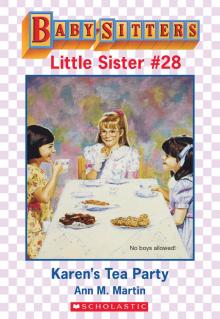 Karen's Tea Party
Karen's Tea Party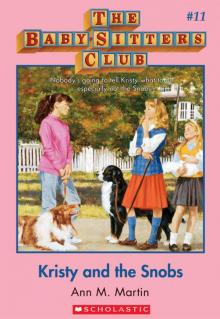 Kristy and the Snobs
Kristy and the Snobs Best Kept Secret
Best Kept Secret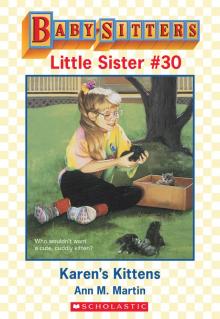 Karen's Kittens
Karen's Kittens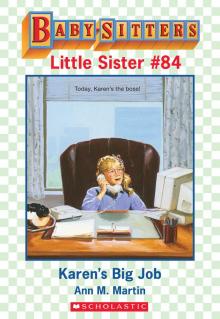 Karen's Big Job
Karen's Big Job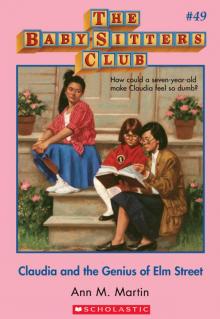 Claudia and the Genius of Elm Street
Claudia and the Genius of Elm Street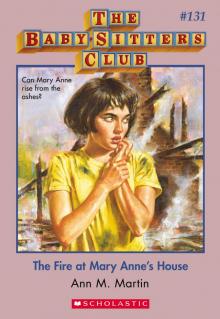 The Fire at Mary Anne's House
The Fire at Mary Anne's House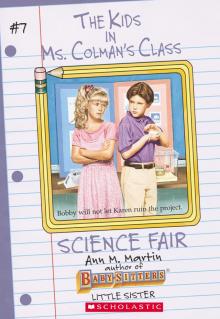 Science Fair
Science Fair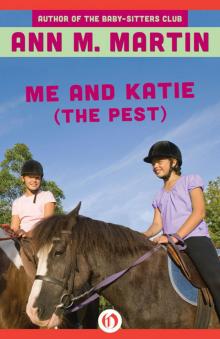 Me and Katie (The Pest)
Me and Katie (The Pest)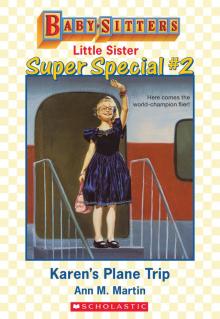 Karen's Plane Trip
Karen's Plane Trip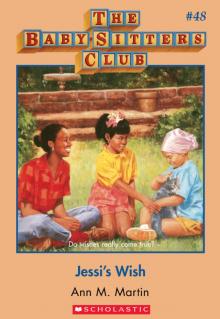 Jessi's Wish
Jessi's Wish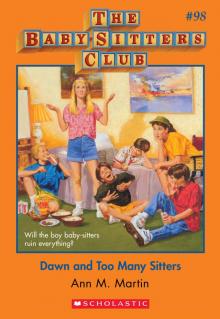 Dawn and Too Many Sitters
Dawn and Too Many Sitters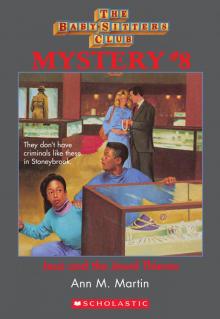 Jessi and the Jewel Thieves
Jessi and the Jewel Thieves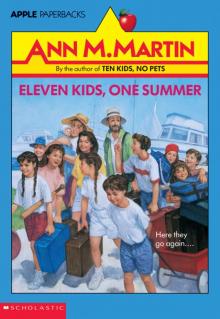 Eleven Kids, One Summer
Eleven Kids, One Summer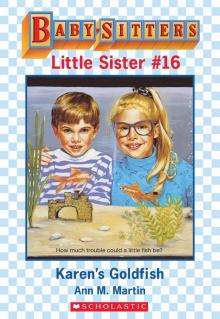 Karen's Goldfish
Karen's Goldfish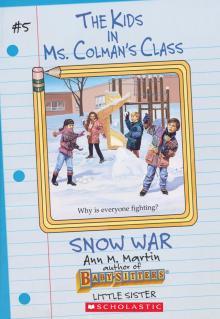 Snow War
Snow War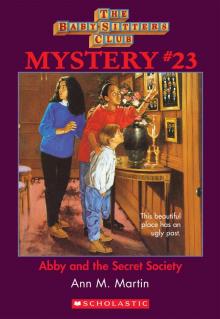 Abby and the Secret Society
Abby and the Secret Society Keeping Secrets
Keeping Secrets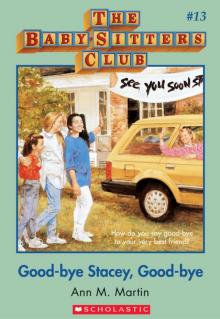 Good-Bye Stacey, Good-Bye
Good-Bye Stacey, Good-Bye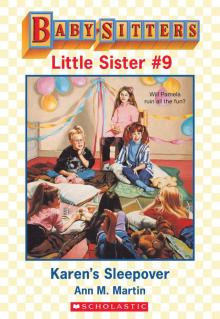 Karen's Sleepover
Karen's Sleepover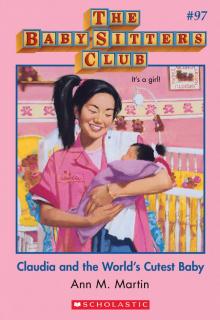 Claudia and the World's Cutest Baby
Claudia and the World's Cutest Baby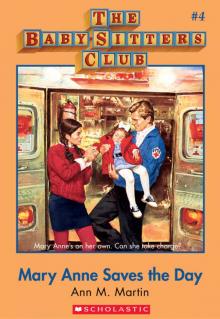 Mary Anne Saves the Day
Mary Anne Saves the Day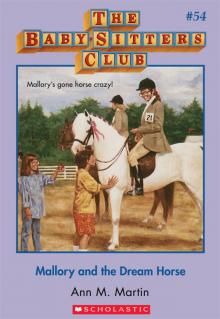 Mallory and the Dream Horse
Mallory and the Dream Horse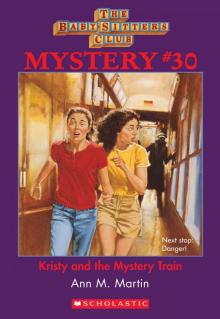 Kristy and the Mystery Train
Kristy and the Mystery Train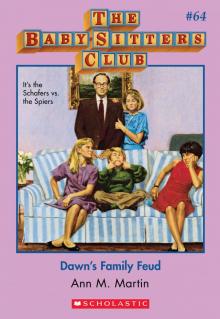 Dawn's Family Feud
Dawn's Family Feud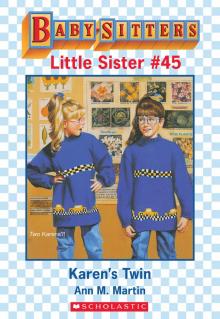 Karen's Twin
Karen's Twin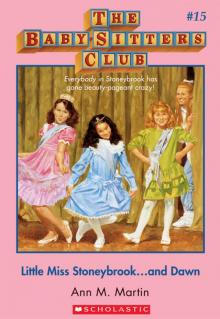 Little Miss Stoneybrook... And Dawn
Little Miss Stoneybrook... And Dawn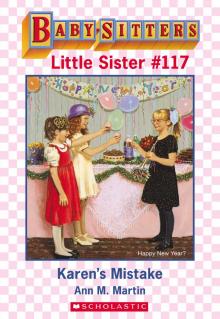 Karen's Mistake
Karen's Mistake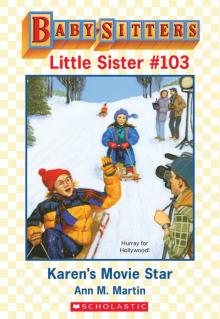 Karen's Movie Star
Karen's Movie Star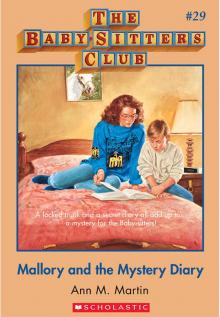 Mallory and the Mystery Diary
Mallory and the Mystery Diary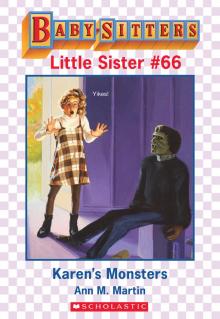 Karen's Monsters
Karen's Monsters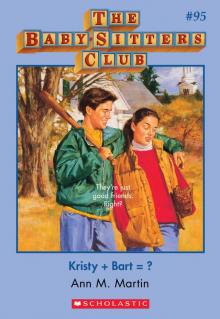 Kristy + Bart = ?
Kristy + Bart = ?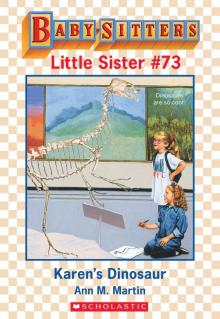 Karen's Dinosaur
Karen's Dinosaur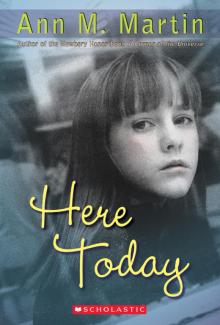 Here Today
Here Today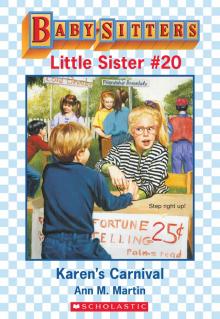 Karen's Carnival
Karen's Carnival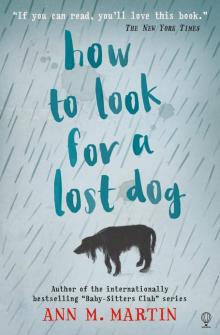 How to Look for a Lost Dog
How to Look for a Lost Dog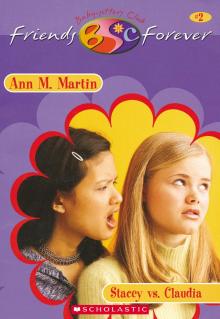 Stacey vs. Claudia
Stacey vs. Claudia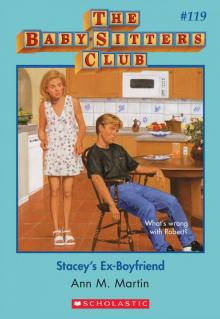 Stacey's Ex-Boyfriend
Stacey's Ex-Boyfriend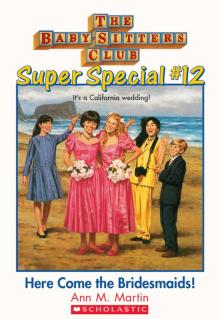 Here Come the Bridesmaids!
Here Come the Bridesmaids! Graduation Day
Graduation Day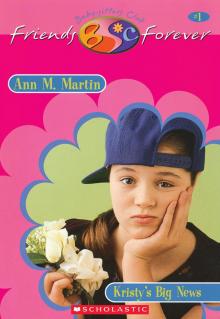 Kristy's Big News
Kristy's Big News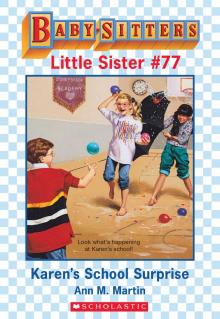 Karen's School Surprise
Karen's School Surprise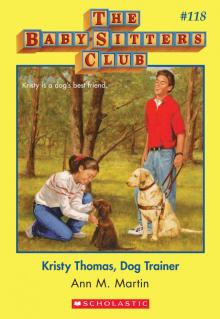 Kristy Thomas, Dog Trainer
Kristy Thomas, Dog Trainer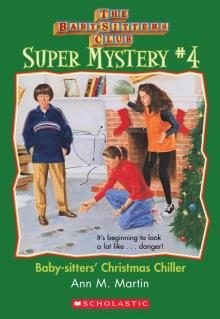 Baby-Sitters' Christmas Chiller
Baby-Sitters' Christmas Chiller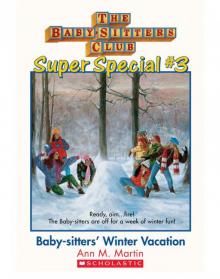 Baby-Sitters' Winter Vacation
Baby-Sitters' Winter Vacation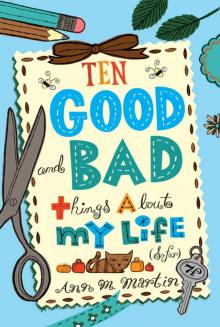 Ten Good and Bad Things About My Life
Ten Good and Bad Things About My Life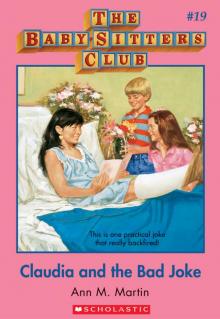 Claudia and the Bad Joke
Claudia and the Bad Joke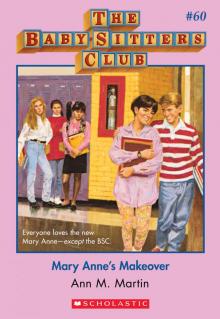 Mary Anne's Makeover
Mary Anne's Makeover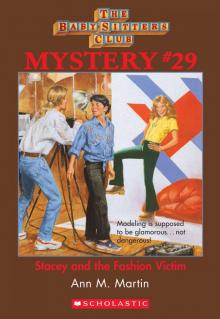 Stacey and the Fashion Victim
Stacey and the Fashion Victim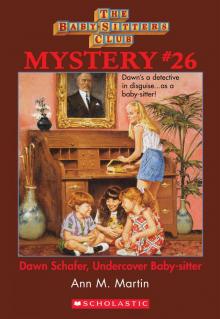 Dawn Schafer, Undercover Baby-Sitter
Dawn Schafer, Undercover Baby-Sitter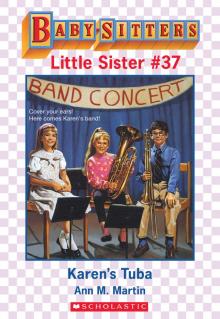 Karen's Tuba
Karen's Tuba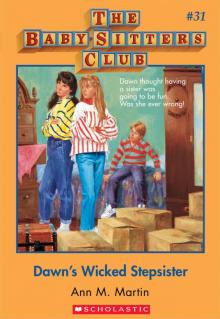 Dawn's Wicked Stepsister
Dawn's Wicked Stepsister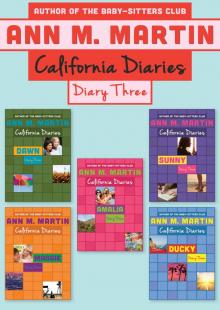 Diary Three: Dawn, Sunny, Maggie, Amalia, and Ducky
Diary Three: Dawn, Sunny, Maggie, Amalia, and Ducky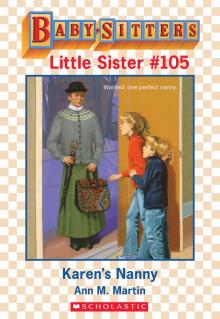 Karen's Nanny
Karen's Nanny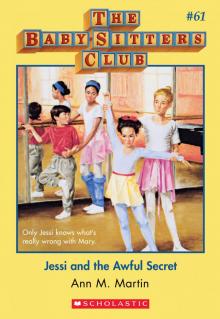 Jessi and the Awful Secret
Jessi and the Awful Secret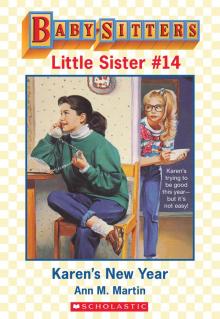 Karen's New Year
Karen's New Year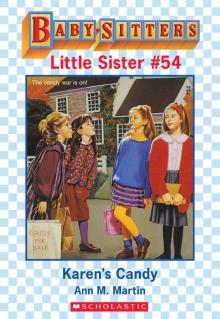 Karen's Candy
Karen's Candy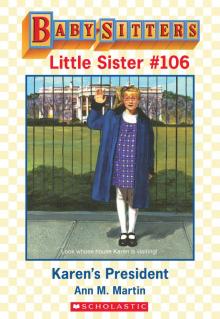 Karen's President
Karen's President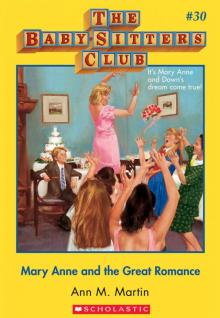 Mary Anne and the Great Romance
Mary Anne and the Great Romance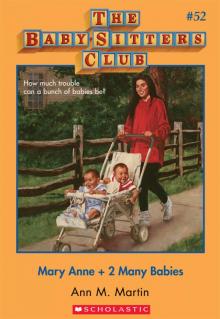 Mary Anne + 2 Many Babies
Mary Anne + 2 Many Babies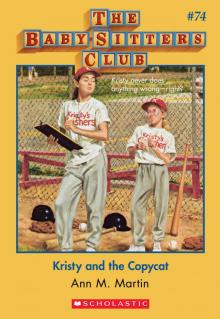 Kristy and the Copycat
Kristy and the Copycat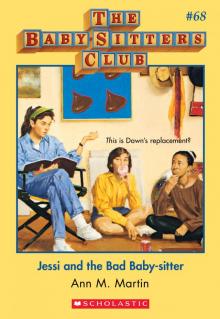 Jessi and the Bad Baby-Sitter
Jessi and the Bad Baby-Sitter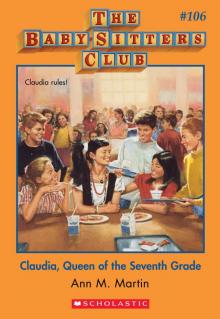 Claudia, Queen of the Seventh Grade
Claudia, Queen of the Seventh Grade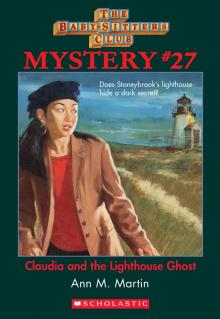 Claudia and the Lighthouse Ghost
Claudia and the Lighthouse Ghost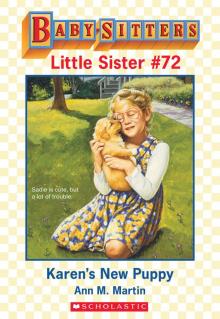 Karen's New Puppy
Karen's New Puppy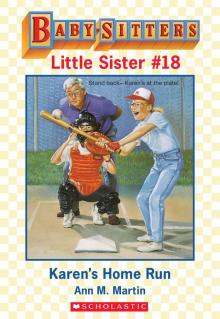 Karen's Home Run
Karen's Home Run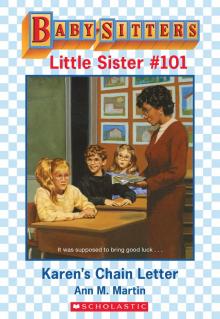 Karen's Chain Letter
Karen's Chain Letter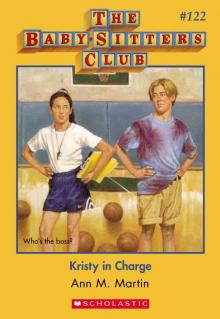 Kristy in Charge
Kristy in Charge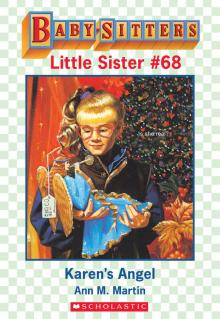 Karen's Angel
Karen's Angel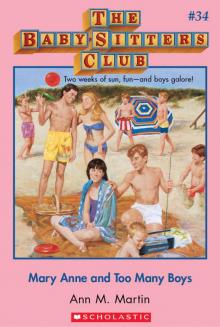 Mary Anne and Too Many Boys
Mary Anne and Too Many Boys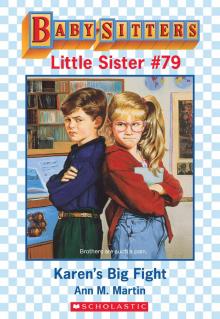 Karen's Big Fight
Karen's Big Fight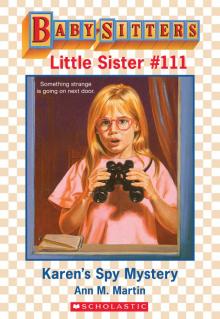 Karen's Spy Mystery
Karen's Spy Mystery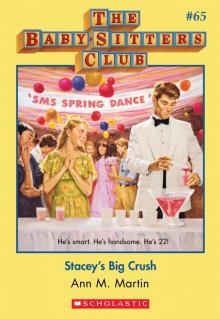 Stacey's Big Crush
Stacey's Big Crush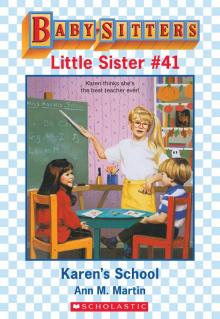 Karen's School
Karen's School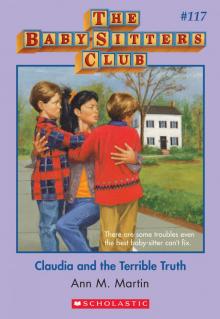 Claudia and the Terrible Truth
Claudia and the Terrible Truth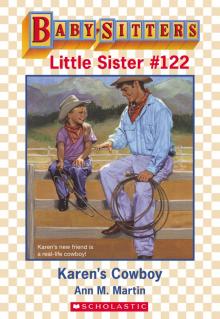 Karen's Cowboy
Karen's Cowboy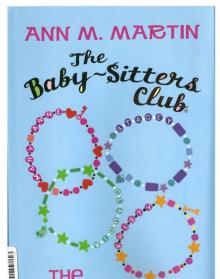 The Summer Before
The Summer Before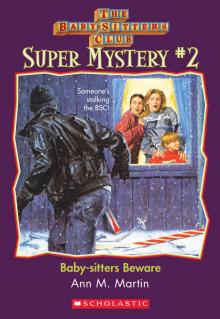 Beware, Dawn!
Beware, Dawn!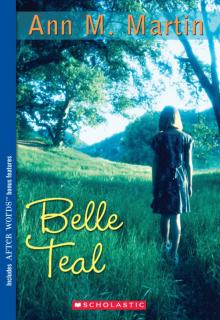 Belle Teale
Belle Teale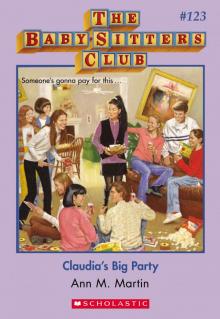 Claudia's Big Party
Claudia's Big Party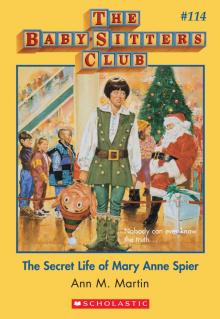 The Secret Life of Mary Anne Spier
The Secret Life of Mary Anne Spier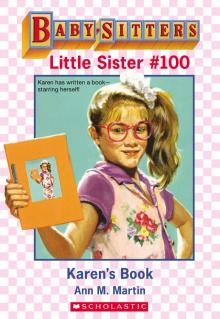 Karen's Book
Karen's Book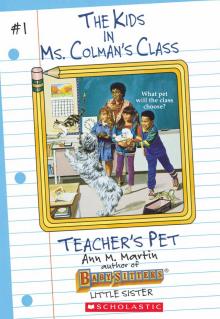 Teacher's Pet
Teacher's Pet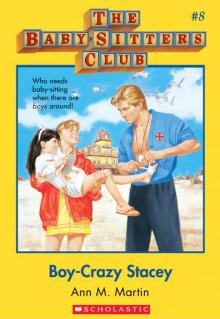 Boy-Crazy Stacey
Boy-Crazy Stacey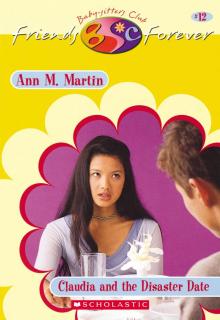 Claudia and the Disaster Date
Claudia and the Disaster Date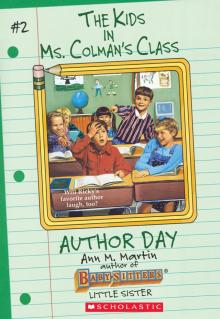 Author Day
Author Day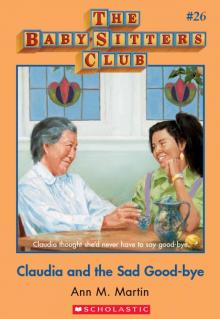 Claudia and the Sad Good-Bye
Claudia and the Sad Good-Bye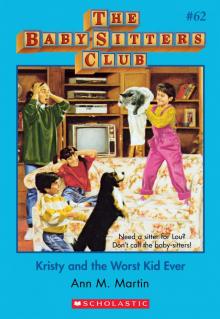 Kristy and the Worst Kid Ever
Kristy and the Worst Kid Ever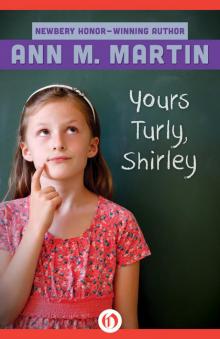 Yours Turly, Shirley
Yours Turly, Shirley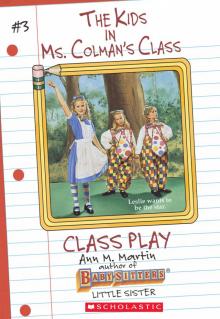 Class Play
Class Play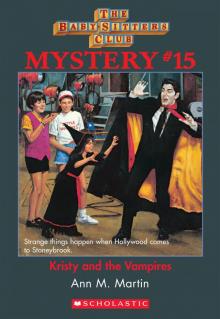 Kristy and the Vampires
Kristy and the Vampires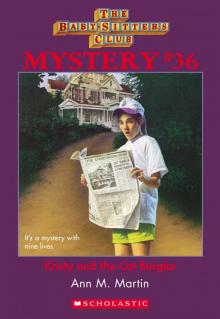 Kristy and the Cat Burglar
Kristy and the Cat Burglar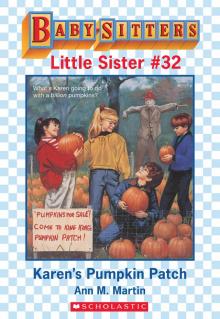 Karen's Pumpkin Patch
Karen's Pumpkin Patch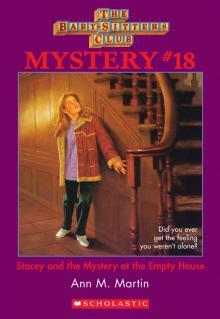 Stacey and the Mystery at the Empty House
Stacey and the Mystery at the Empty House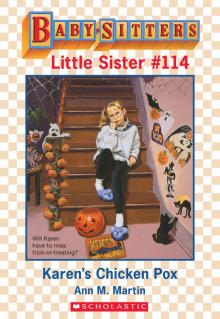 Karen's Chicken Pox
Karen's Chicken Pox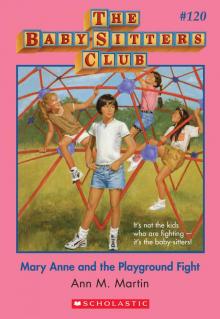 Mary Anne and the Playground Fight
Mary Anne and the Playground Fight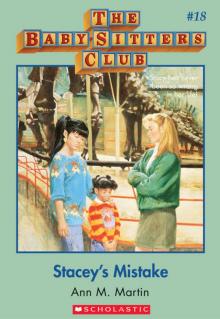 Stacey's Mistake
Stacey's Mistake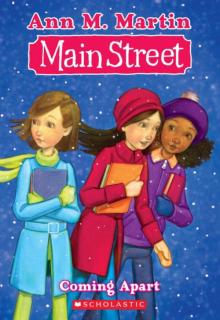 Coming Apart
Coming Apart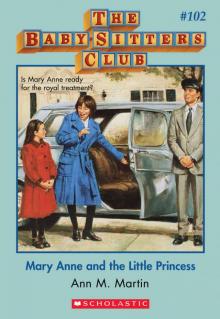 Mary Anne and the Little Princess
Mary Anne and the Little Princess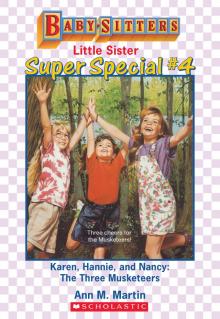 Karen, Hannie and Nancy: The Three Musketeers
Karen, Hannie and Nancy: The Three Musketeers 'Tis the Season
'Tis the Season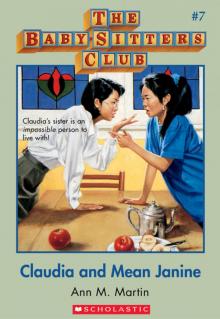 Claudia and Mean Janine
Claudia and Mean Janine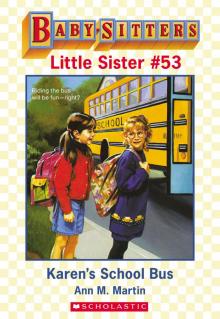 Karen's School Bus
Karen's School Bus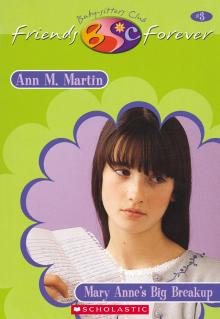 Mary Anne's Big Breakup
Mary Anne's Big Breakup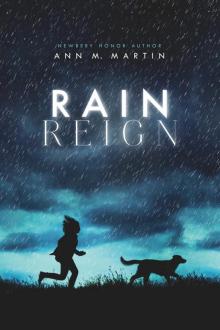 Rain Reign
Rain Reign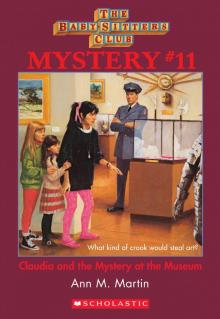 Claudia and the Mystery at the Museum
Claudia and the Mystery at the Museum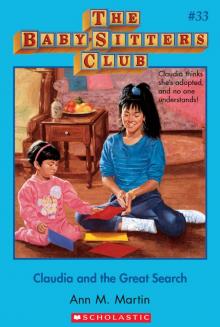 Claudia and the Great Search
Claudia and the Great Search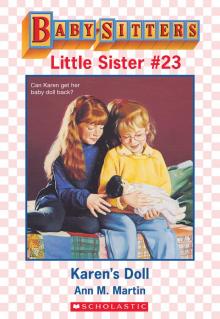 Karen's Doll
Karen's Doll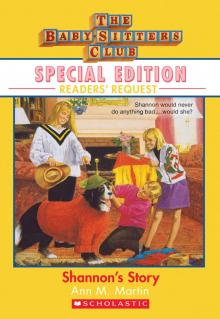 Shannon's Story
Shannon's Story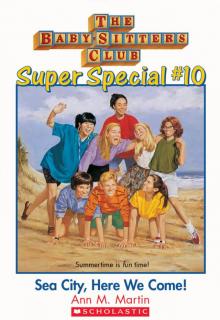 Sea City, Here We Come!
Sea City, Here We Come!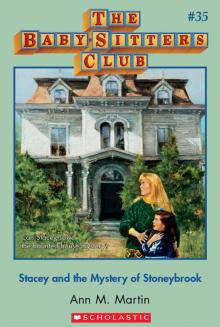 Stacey and the Mystery of Stoneybrook
Stacey and the Mystery of Stoneybrook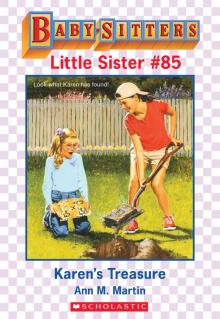 Karen's Treasure
Karen's Treasure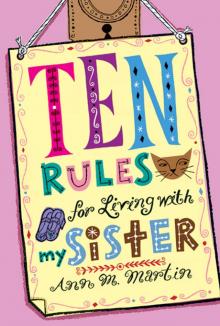 Ten Rules for Living With My Sister
Ten Rules for Living With My Sister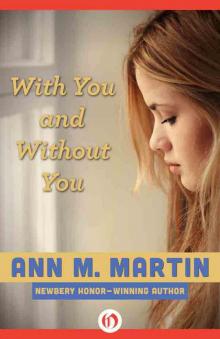 With You and Without You
With You and Without You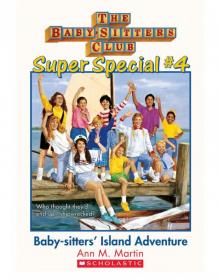 Baby-Sitters' Island Adventure
Baby-Sitters' Island Adventure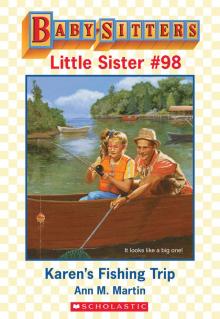 Karen's Fishing Trip
Karen's Fishing Trip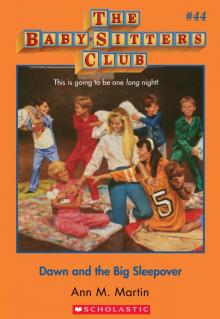 Dawn and the Big Sleepover
Dawn and the Big Sleepover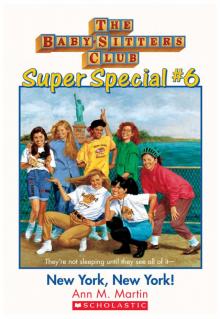 New York, New York!
New York, New York!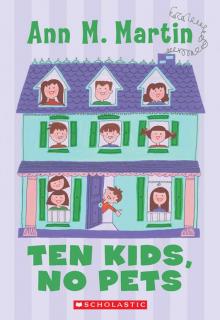 Ten Kids, No Pets
Ten Kids, No Pets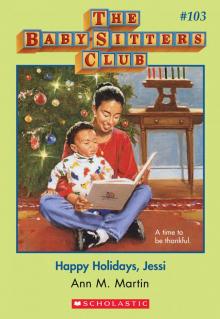 Happy Holidays, Jessi
Happy Holidays, Jessi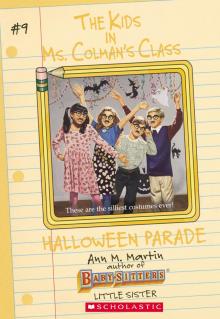 Halloween Parade
Halloween Parade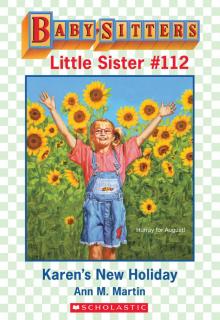 Karen's New Holiday
Karen's New Holiday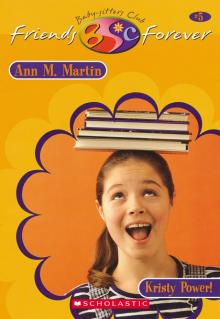 Kristy Power!
Kristy Power!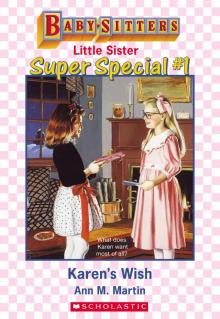 Karen's Wish
Karen's Wish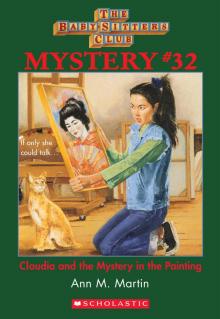 Claudia and the Mystery in the Painting
Claudia and the Mystery in the Painting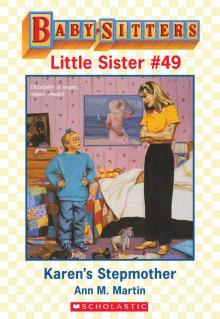 Karen's Stepmother
Karen's Stepmother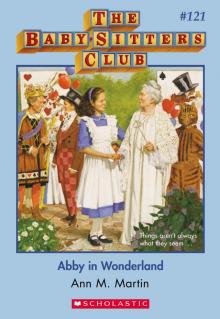 Abby in Wonderland
Abby in Wonderland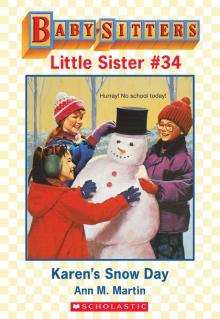 Karen's Snow Day
Karen's Snow Day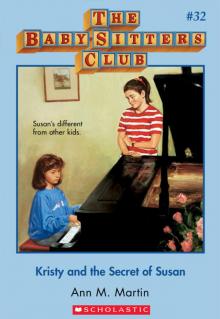 Kristy and the Secret of Susan
Kristy and the Secret of Susan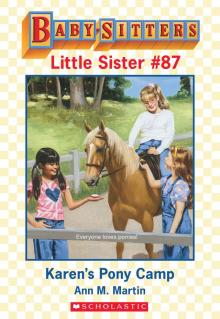 Karen's Pony Camp
Karen's Pony Camp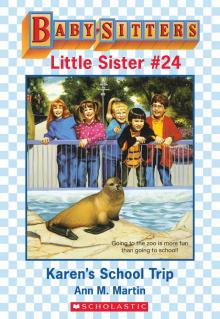 Karen's School Trip
Karen's School Trip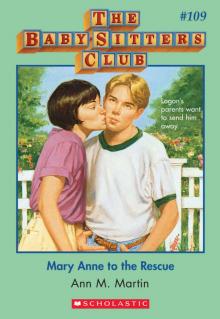 Mary Anne to the Rescue
Mary Anne to the Rescue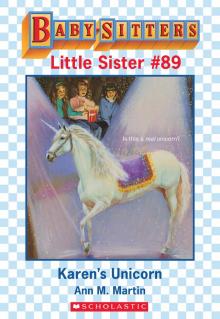 Karen's Unicorn
Karen's Unicorn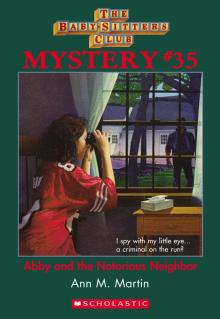 Abby and the Notorious Neighbor
Abby and the Notorious Neighbor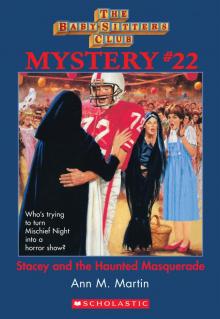 Stacey and the Haunted Masquerade
Stacey and the Haunted Masquerade Claudia Gets Her Guy
Claudia Gets Her Guy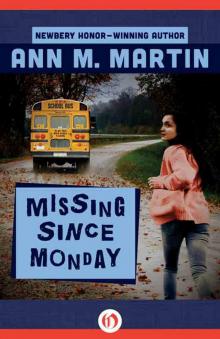 Missing Since Monday
Missing Since Monday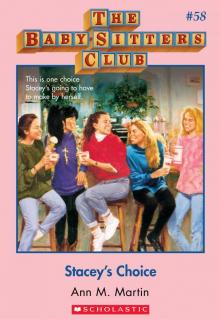 Stacey's Choice
Stacey's Choice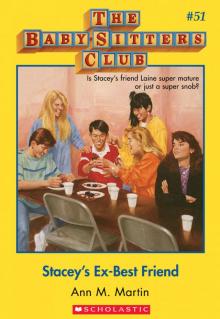 Stacey's Ex-Best Friend
Stacey's Ex-Best Friend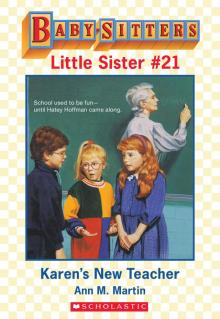 Karen's New Teacher
Karen's New Teacher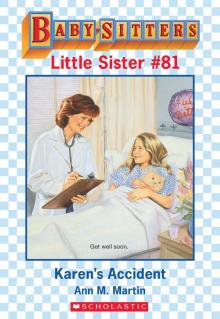 Karen's Accident
Karen's Accident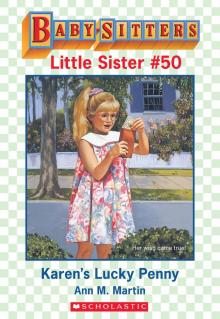 Karen's Lucky Penny
Karen's Lucky Penny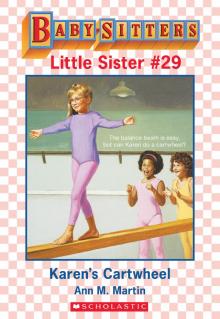 Karen's Cartwheel
Karen's Cartwheel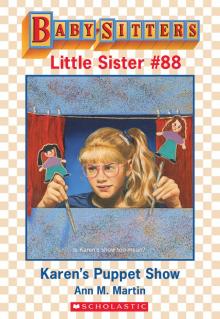 Karen's Puppet Show
Karen's Puppet Show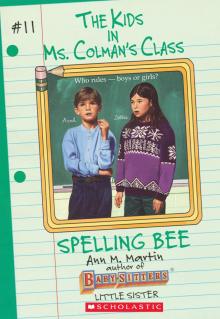 Spelling Bee
Spelling Bee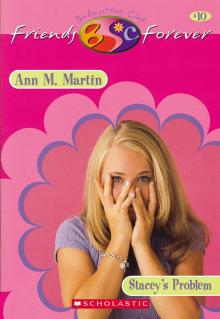 Stacey's Problem
Stacey's Problem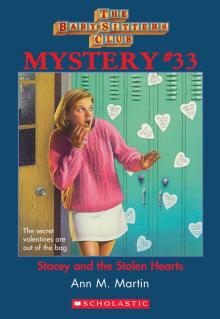 Stacey and the Stolen Hearts
Stacey and the Stolen Hearts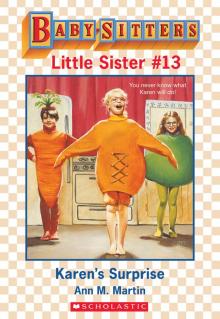 Karen's Surprise
Karen's Surprise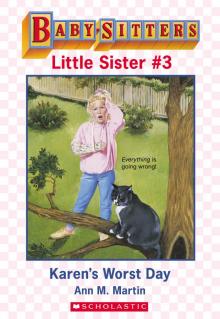 Karen's Worst Day
Karen's Worst Day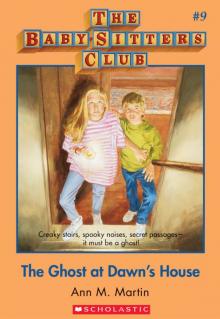 The Ghost at Dawn's House
The Ghost at Dawn's House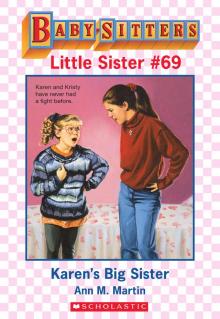 Karen's Big Sister
Karen's Big Sister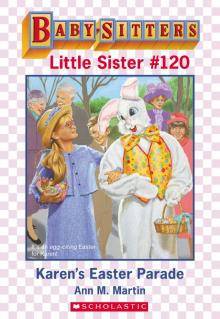 Karen's Easter Parade
Karen's Easter Parade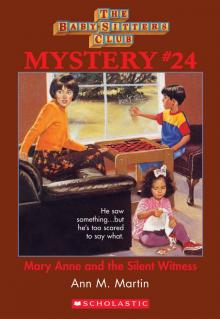 Mary Anne and the Silent Witness
Mary Anne and the Silent Witness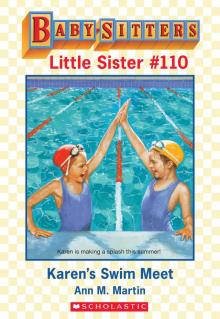 Karen's Swim Meet
Karen's Swim Meet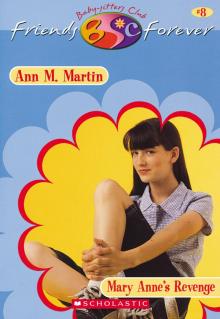 Mary Anne's Revenge
Mary Anne's Revenge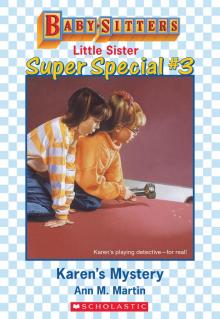 Karen's Mystery
Karen's Mystery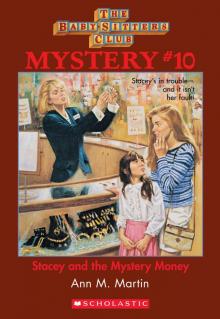 Stacey and the Mystery Money
Stacey and the Mystery Money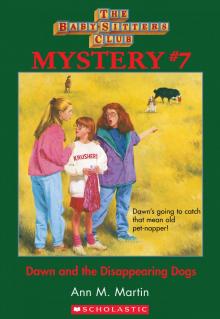 Dawn and the Disappearing Dogs
Dawn and the Disappearing Dogs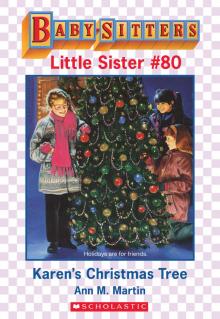 Karen's Christmas Tree
Karen's Christmas Tree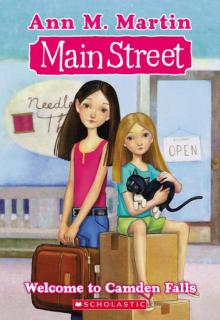 Welcome to Camden Falls
Welcome to Camden Falls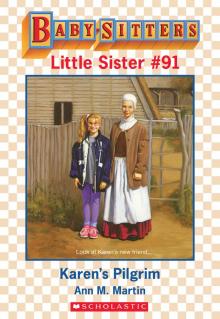 Karen's Pilgrim
Karen's Pilgrim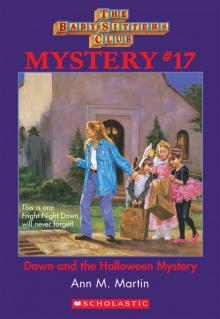 Dawn and the Halloween Mystery
Dawn and the Halloween Mystery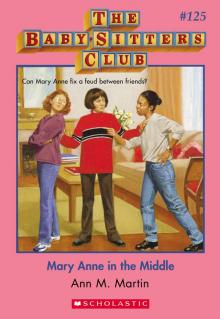 Mary Anne in the Middle
Mary Anne in the Middle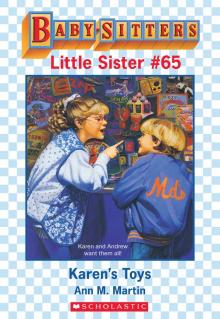 Karen's Toys
Karen's Toys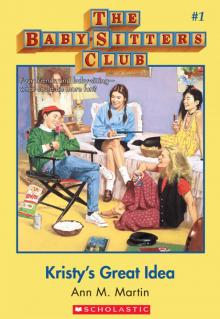 Kristy's Great Idea
Kristy's Great Idea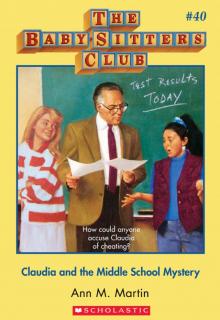 Claudia and the Middle School Mystery
Claudia and the Middle School Mystery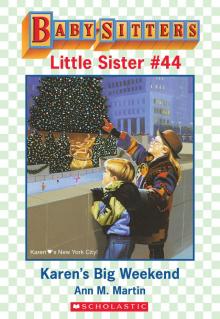 Karen's Big Weekend
Karen's Big Weekend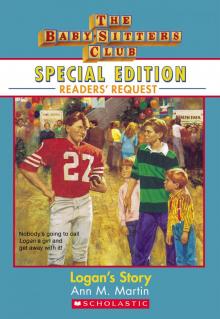 Logan's Story
Logan's Story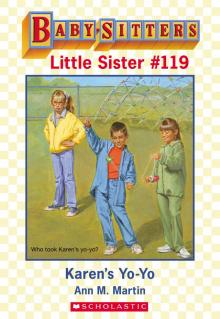 Karen's Yo-Yo
Karen's Yo-Yo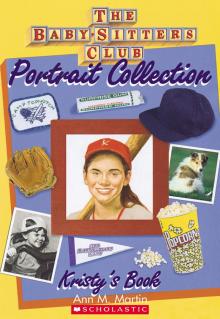 Kristy's Book
Kristy's Book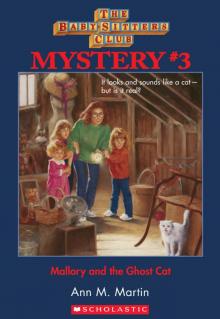 Mallory and the Ghost Cat
Mallory and the Ghost Cat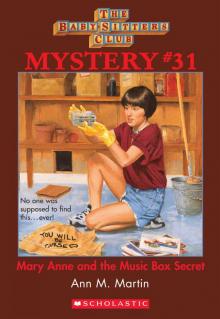 Mary Anne and the Music
Mary Anne and the Music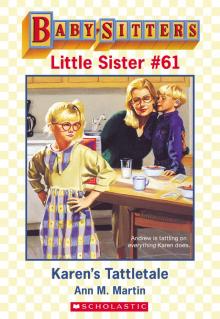 Karen's Tattletale
Karen's Tattletale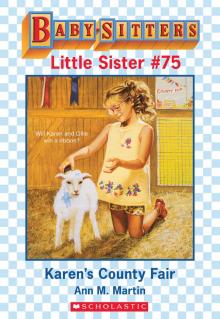 Karen's County Fair
Karen's County Fair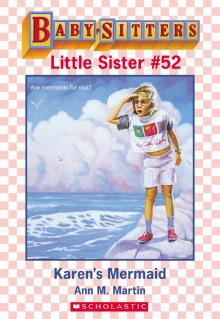 Karen's Mermaid
Karen's Mermaid Snowbound
Snowbound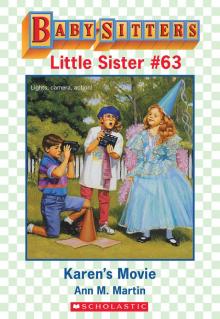 Karen's Movie
Karen's Movie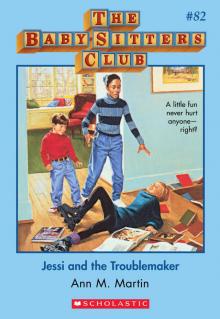 Jessi and the Troublemaker
Jessi and the Troublemaker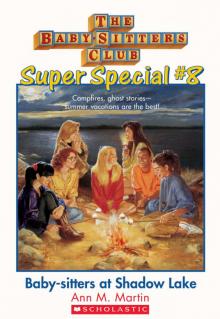 Baby-Sitters at Shadow Lake
Baby-Sitters at Shadow Lake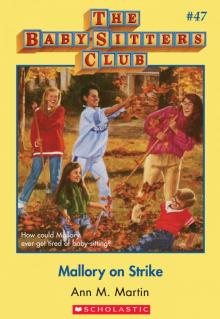 Mallory on Strike
Mallory on Strike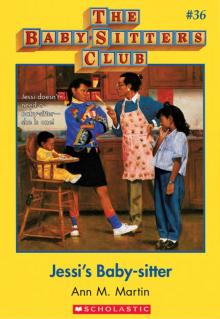 Jessi's Baby-Sitter
Jessi's Baby-Sitter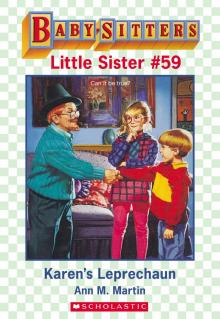 Karen's Leprechaun
Karen's Leprechaun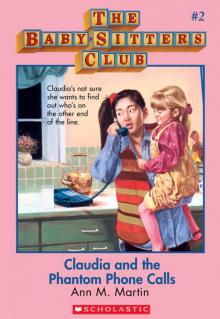 Claudia and the Phantom Phone Calls
Claudia and the Phantom Phone Calls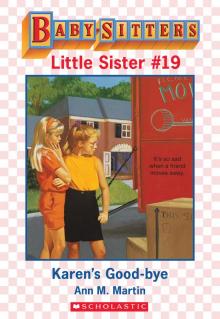 Karen's Good-Bye
Karen's Good-Bye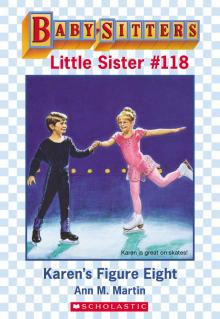 Karen's Figure Eight
Karen's Figure Eight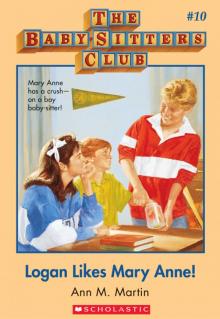 Logan Likes Mary Anne!
Logan Likes Mary Anne!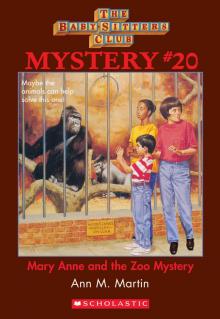 Mary Anne and the Zoo Mystery
Mary Anne and the Zoo Mystery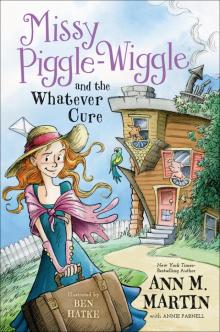 Missy Piggle-Wiggle and the Whatever Cure
Missy Piggle-Wiggle and the Whatever Cure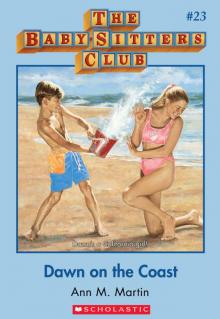 Dawn on the Coast
Dawn on the Coast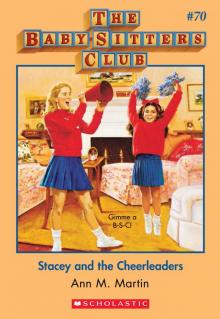 Stacey and the Cheerleaders
Stacey and the Cheerleaders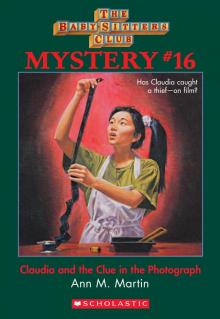 Claudia and the Clue in the Photograph
Claudia and the Clue in the Photograph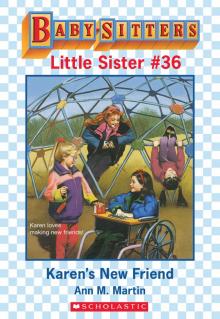 Karen's New Friend
Karen's New Friend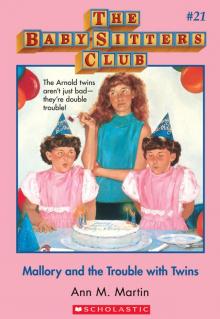 Mallory and the Trouble With Twins
Mallory and the Trouble With Twins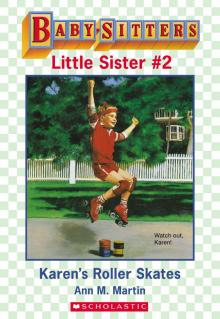 Karen's Roller Skates
Karen's Roller Skates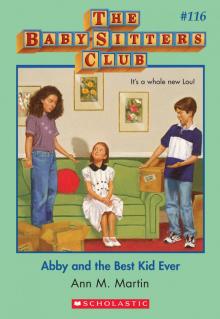 Abby and the Best Kid Ever
Abby and the Best Kid Ever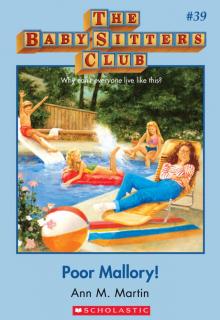 Poor Mallory!
Poor Mallory!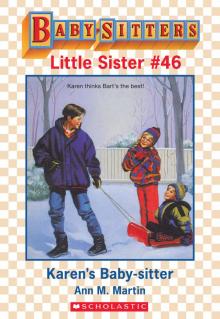 Karen's Witch
Karen's Witch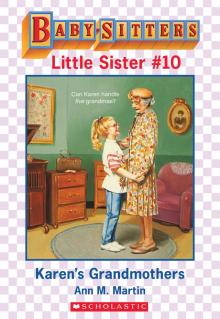 Karen's Grandmothers
Karen's Grandmothers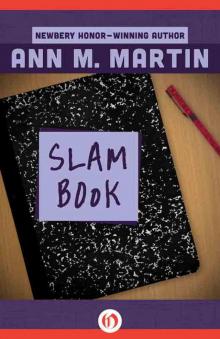 Slam Book
Slam Book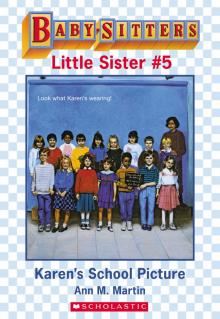 Karen's School Picture
Karen's School Picture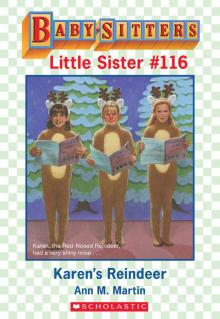 Karen's Reindeer
Karen's Reindeer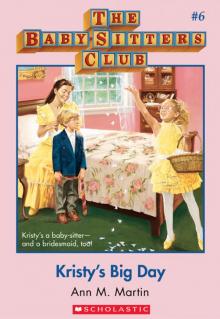 Kristy's Big Day
Kristy's Big Day The Long Way Home
The Long Way Home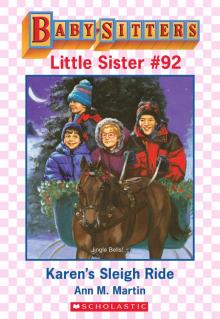 Karen's Sleigh Ride
Karen's Sleigh Ride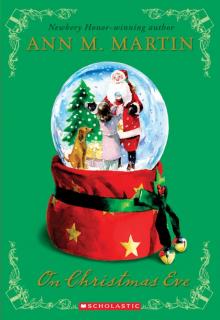 On Christmas Eve
On Christmas Eve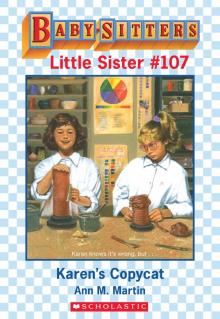 Karen's Copycat
Karen's Copycat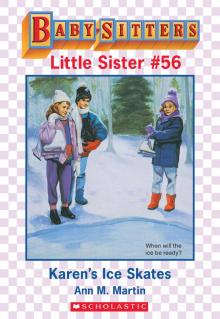 Karen's Ice Skates
Karen's Ice Skates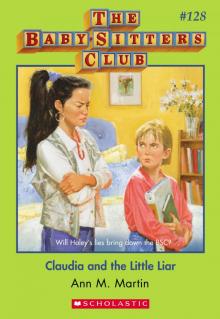 Claudia and the Little Liar
Claudia and the Little Liar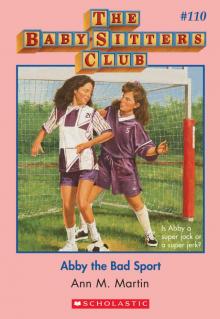 Abby the Bad Sport
Abby the Bad Sport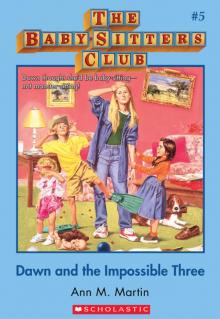 The Baby-Sitters Club #5: Dawn and the Impossible Three
The Baby-Sitters Club #5: Dawn and the Impossible Three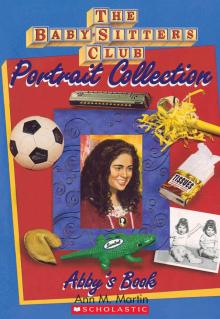 Abby's Book
Abby's Book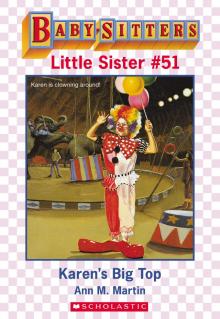 Karen's Big Top
Karen's Big Top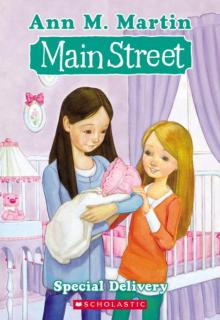 Main Street #8: Special Delivery
Main Street #8: Special Delivery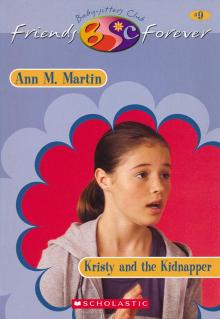 Kristy and the Kidnapper
Kristy and the Kidnapper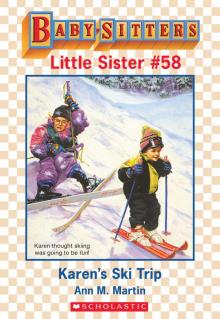 Karen's Ski Trip
Karen's Ski Trip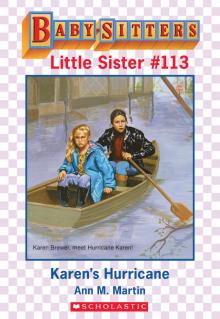 Karen's Hurricane
Karen's Hurricane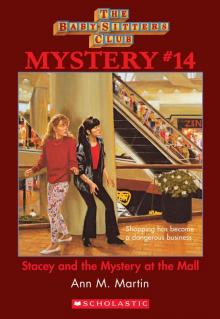 Stacey and the Mystery at the Mall
Stacey and the Mystery at the Mall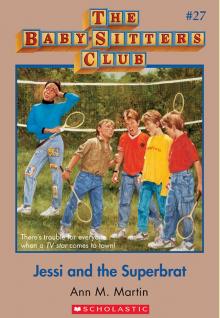 Jessi and the Superbrat
Jessi and the Superbrat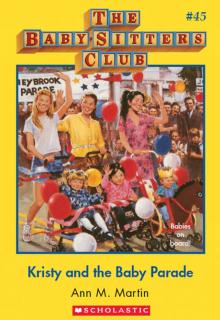 Kristy and the Baby Parade
Kristy and the Baby Parade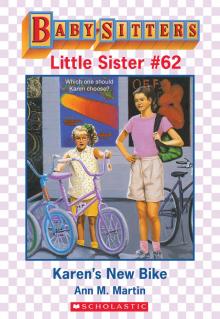 Karen's New Bike
Karen's New Bike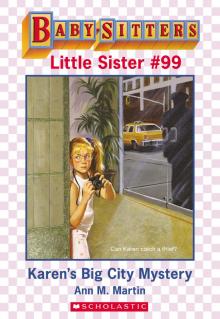 Karen's Big City Mystery
Karen's Big City Mystery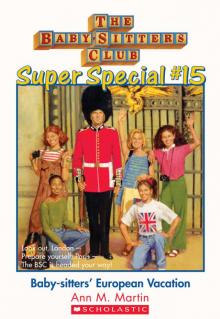 Baby-Sitters' European Vacation
Baby-Sitters' European Vacation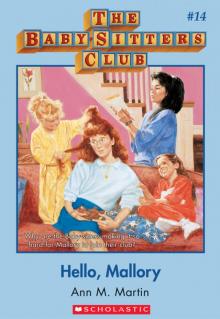 Hello, Mallory
Hello, Mallory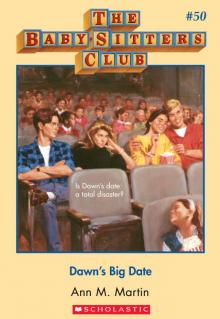 Dawn's Big Date
Dawn's Big Date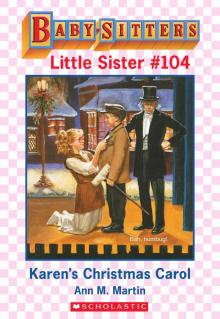 Karen's Christmas Carol
Karen's Christmas Carol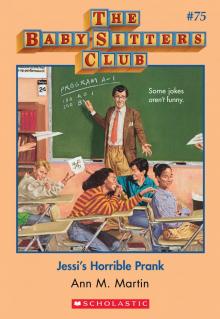 Jessi's Horrible Prank
Jessi's Horrible Prank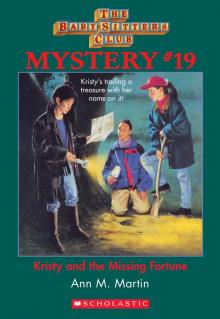 Kristy and the Missing Fortune
Kristy and the Missing Fortune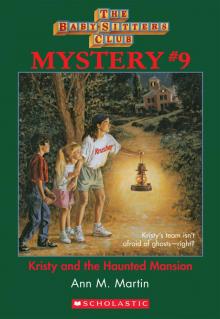 Kristy and the Haunted Mansion
Kristy and the Haunted Mansion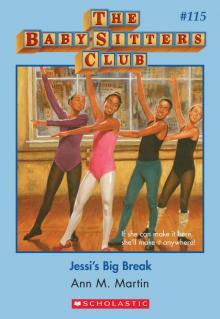 Jessi's Big Break
Jessi's Big Break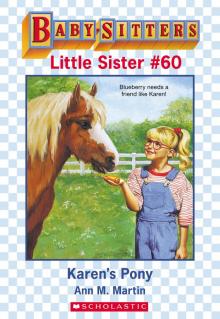 Karen's Pony
Karen's Pony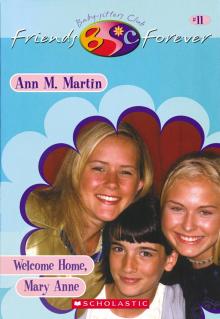 Welcome Home, Mary Anne
Welcome Home, Mary Anne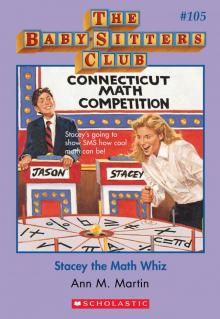 Stacey the Math Whiz
Stacey the Math Whiz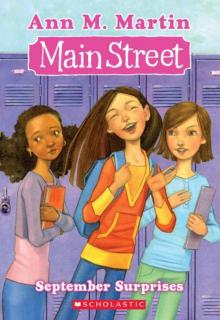 September Surprises
September Surprises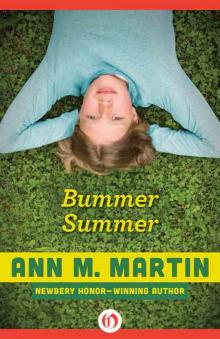 Bummer Summer
Bummer Summer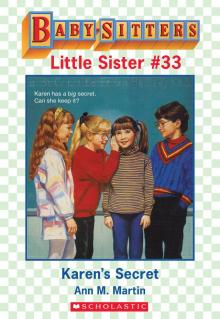 Karen's Secret
Karen's Secret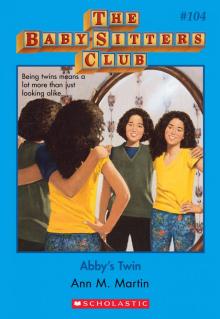 Abby's Twin
Abby's Twin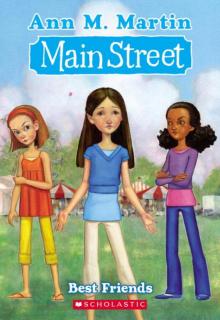 Main Street #4: Best Friends
Main Street #4: Best Friends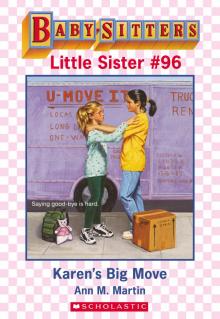 Karen's Big Move
Karen's Big Move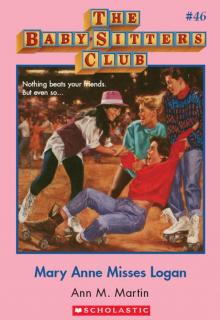 Mary Anne Misses Logan
Mary Anne Misses Logan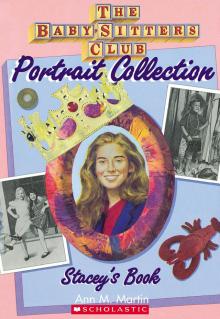 Stacey's Book
Stacey's Book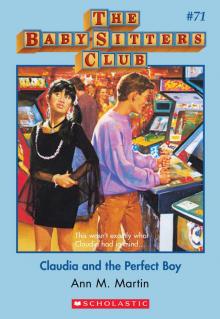 Claudia and the Perfect Boy
Claudia and the Perfect Boy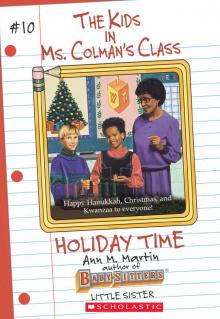 Holiday Time
Holiday Time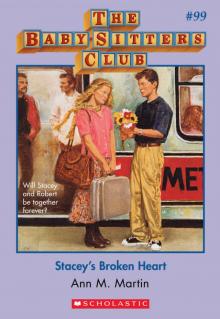 Stacey's Broken Heart
Stacey's Broken Heart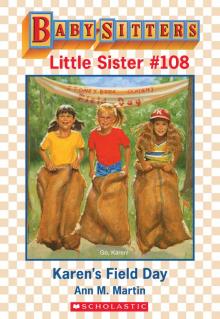 Karen's Field Day
Karen's Field Day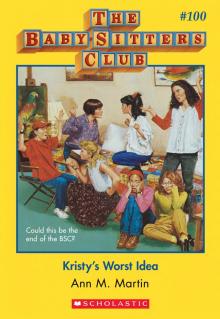 Kristy's Worst Idea
Kristy's Worst Idea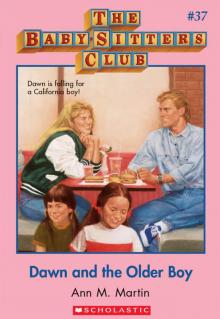 Dawn and the Older Boy
Dawn and the Older Boy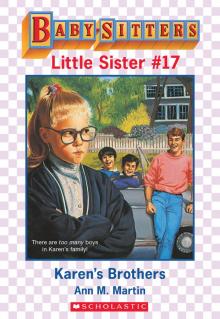 Karen's Brothers
Karen's Brothers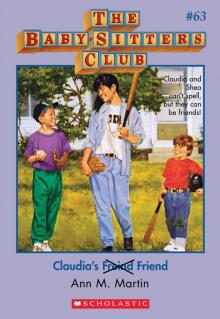 Claudia's Friend
Claudia's Friend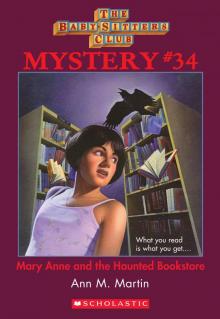 Mary Anne and the Haunted Bookstore
Mary Anne and the Haunted Bookstore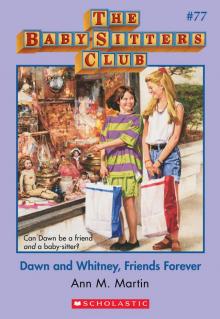 Dawn and Whitney, Friends Forever
Dawn and Whitney, Friends Forever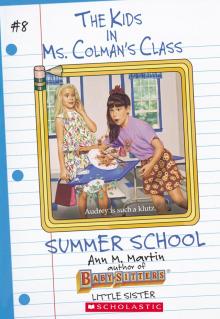 Summer School
Summer School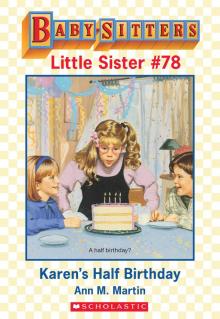 Karen's Birthday
Karen's Birthday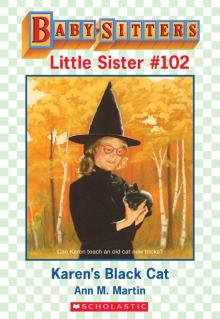 Karen's Black Cat
Karen's Black Cat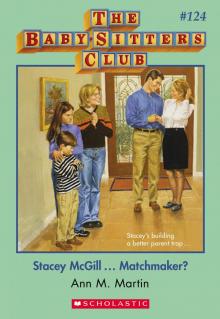 Stacey McGill... Matchmaker?
Stacey McGill... Matchmaker?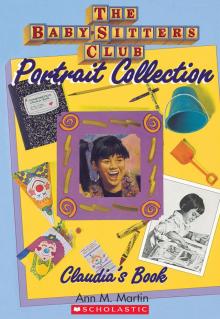 Claudia's Book
Claudia's Book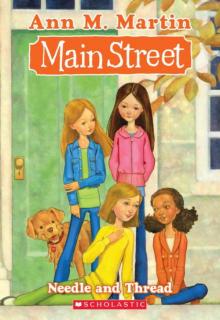 Main Street #2: Needle and Thread
Main Street #2: Needle and Thread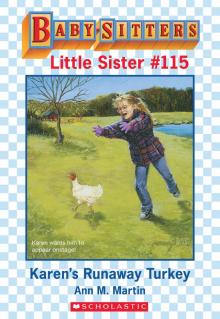 Karen's Runaway Turkey
Karen's Runaway Turkey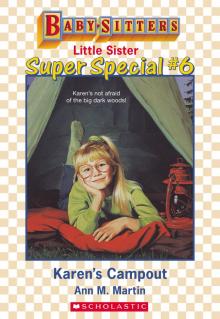 Karen's Campout
Karen's Campout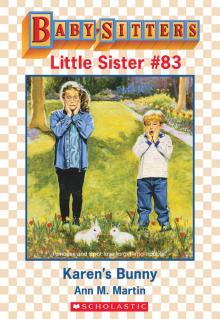 Karen's Bunny
Karen's Bunny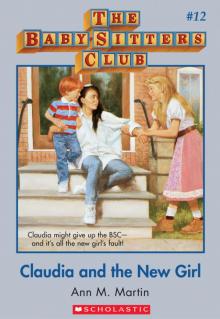 Claudia and the New Girl
Claudia and the New Girl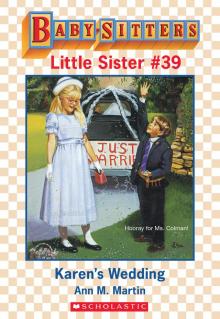 Karen's Wedding
Karen's Wedding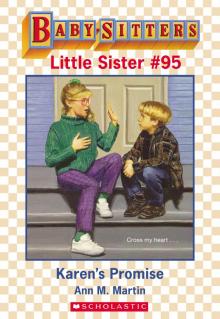 Karen's Promise
Karen's Promise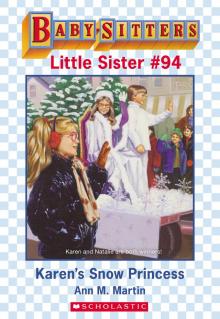 Karen's Snow Princess
Karen's Snow Princess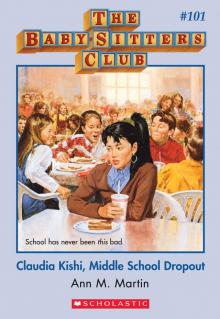 Claudia Kishi, Middle School Dropout
Claudia Kishi, Middle School Dropout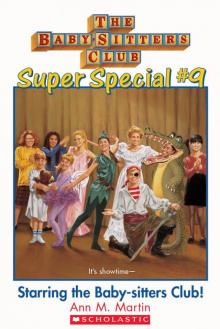 Starring the Baby-Sitters Club!
Starring the Baby-Sitters Club!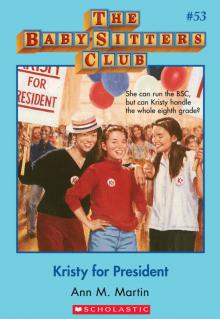 Kristy for President
Kristy for President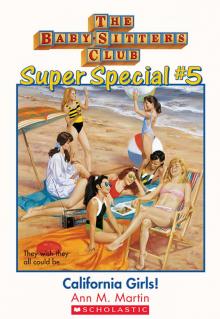 California Girls!
California Girls!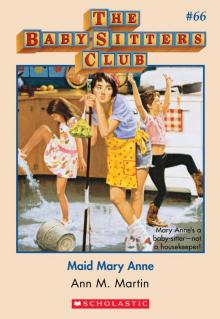 Maid Mary Anne
Maid Mary Anne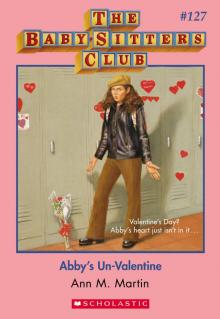 Abby's Un-Valentine
Abby's Un-Valentine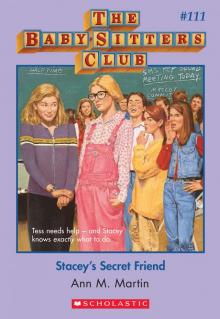 Stacey's Secret Friend
Stacey's Secret Friend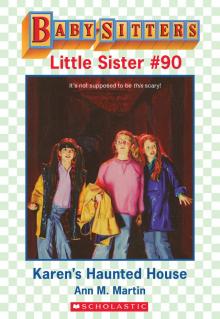 Karen's Haunted House
Karen's Haunted House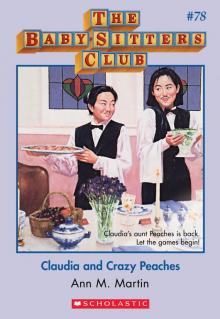 Claudia and Crazy Peaches
Claudia and Crazy Peaches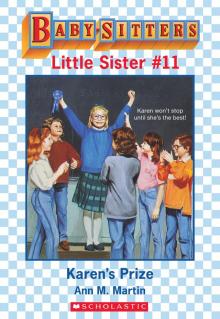 Karen's Prize
Karen's Prize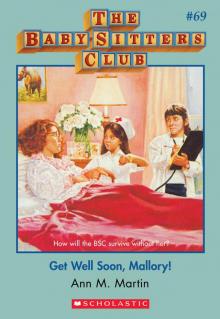 Get Well Soon, Mallory!
Get Well Soon, Mallory!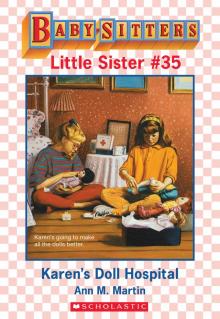 Karen's Doll Hospital
Karen's Doll Hospital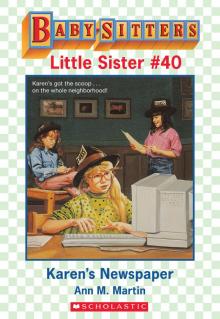 Karen's Newspaper
Karen's Newspaper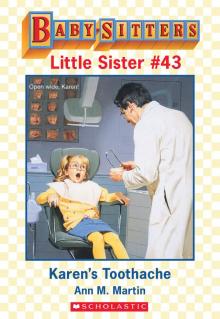 Karen's Toothache
Karen's Toothache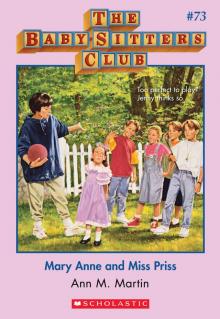 Mary Anne and Miss Priss
Mary Anne and Miss Priss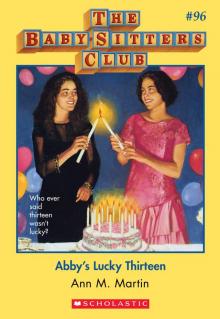 Abby's Lucky Thirteen
Abby's Lucky Thirteen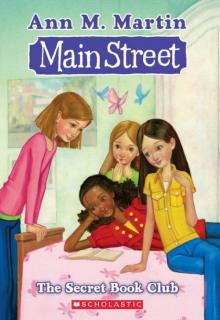 The Secret Book Club
The Secret Book Club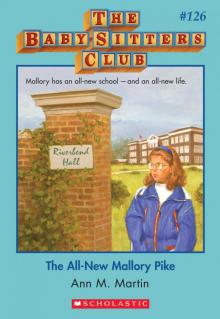 The All-New Mallory Pike
The All-New Mallory Pike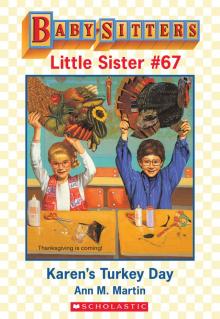 Karen's Turkey Day
Karen's Turkey Day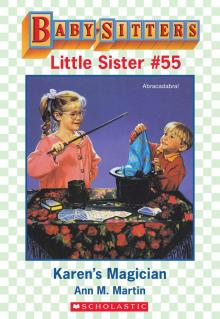 Karen's Magician
Karen's Magician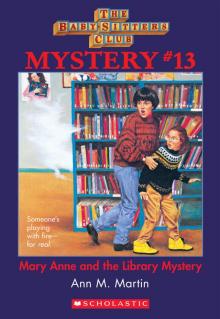 Mary Anne and the Library Mystery
Mary Anne and the Library Mystery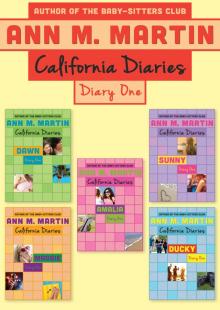 Diary One: Dawn, Sunny, Maggie, Amalia, and Ducky
Diary One: Dawn, Sunny, Maggie, Amalia, and Ducky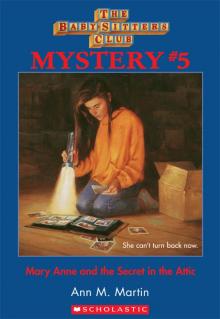 Mary Anne and the Secret in the Attic
Mary Anne and the Secret in the Attic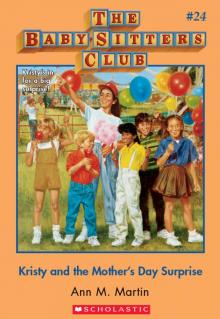 Kristy and the Mother's Day Surprise
Kristy and the Mother's Day Surprise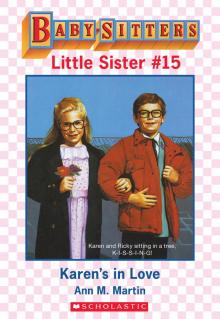 Karen's in Love
Karen's in Love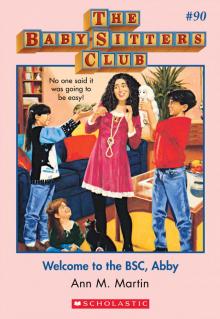 Welcome to the BSC, Abby
Welcome to the BSC, Abby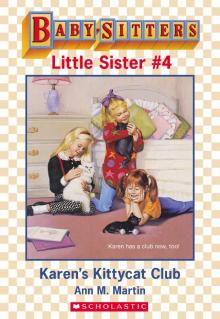 Karen's Kittycat Club
Karen's Kittycat Club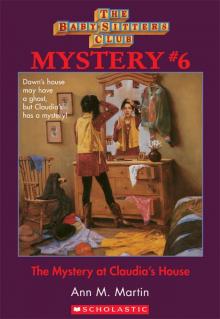 The Mystery at Claudia's House
The Mystery at Claudia's House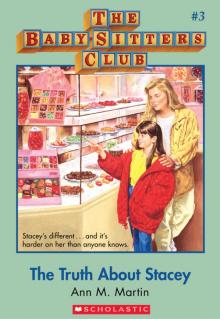 The Truth About Stacey
The Truth About Stacey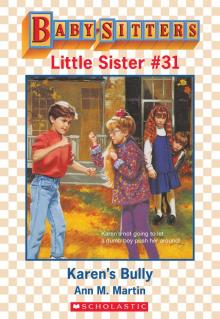 Karen's Bully
Karen's Bully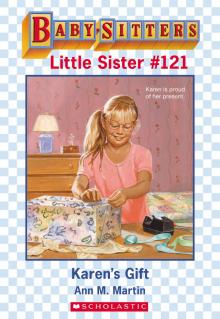 Karen's Gift
Karen's Gift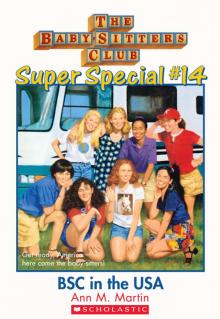 BSC in the USA
BSC in the USA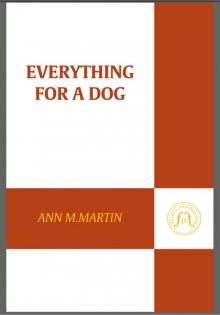 Everything for a Dog
Everything for a Dog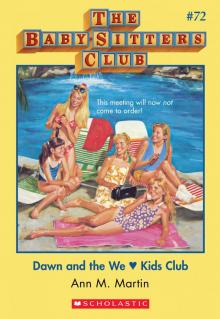 Dawn and the We Love Kids Club
Dawn and the We Love Kids Club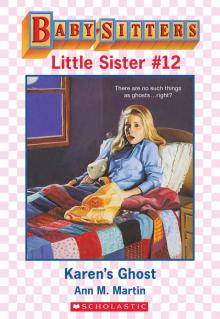 Karen's Ghost
Karen's Ghost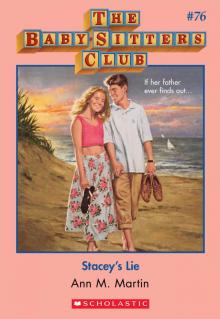 Stacey's Lie
Stacey's Lie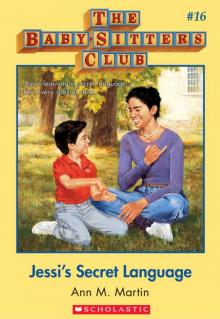 Jessi's Secret Language
Jessi's Secret Language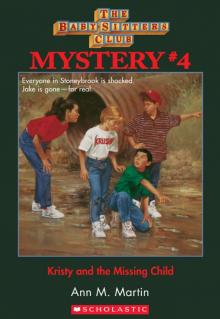 Kristy and the Missing Child
Kristy and the Missing Child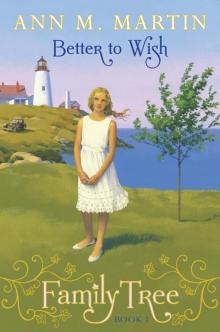 Better to Wish
Better to Wish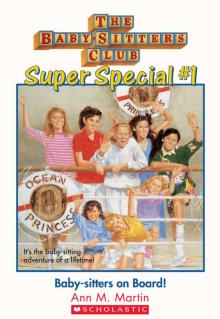 Baby-Sitters on Board!
Baby-Sitters on Board!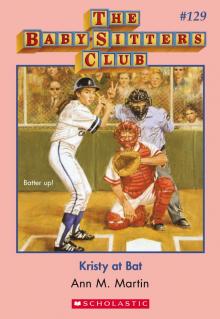 Kristy at Bat
Kristy at Bat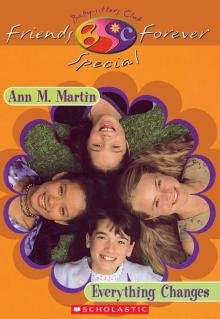 Everything Changes
Everything Changes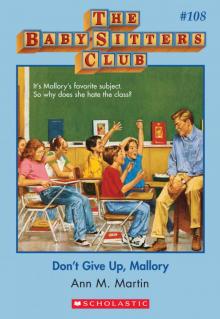 Don't Give Up, Mallory
Don't Give Up, Mallory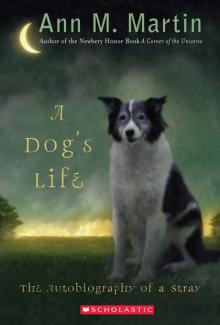 A Dog's Life: The Autobiography of a Stray
A Dog's Life: The Autobiography of a Stray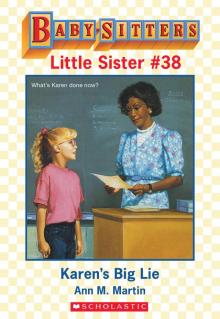 Karen's Big Lie
Karen's Big Lie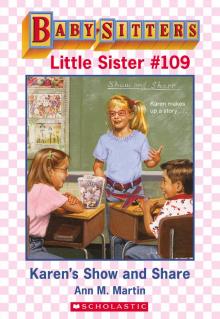 Karen's Show and Share
Karen's Show and Share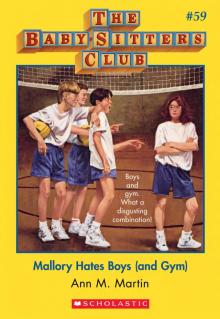 Mallory Hates Boys (and Gym)
Mallory Hates Boys (and Gym)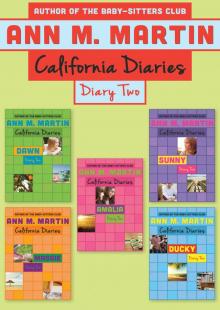 Diary Two: Dawn, Sunny, Maggie, Amalia, and Ducky
Diary Two: Dawn, Sunny, Maggie, Amalia, and Ducky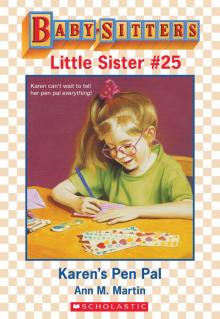 Karen's Pen Pal
Karen's Pen Pal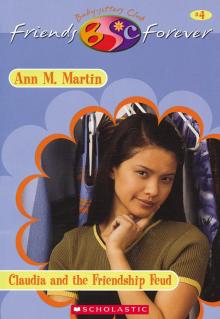 Claudia and the Friendship Feud
Claudia and the Friendship Feud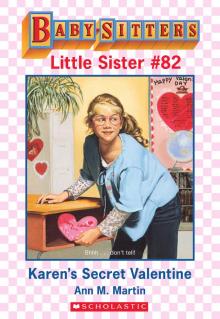 Karen's Secret Valentine
Karen's Secret Valentine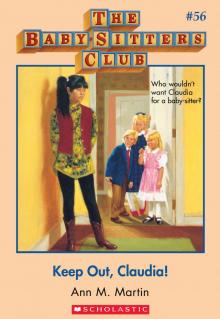 Keep Out, Claudia!
Keep Out, Claudia!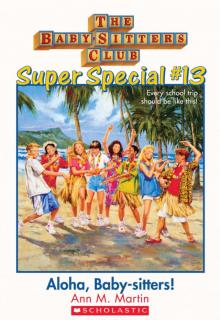 Aloha, Baby-Sitters!
Aloha, Baby-Sitters!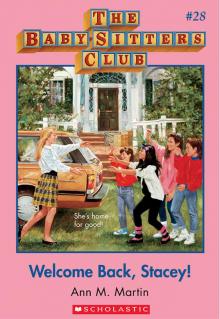 Welcome Back, Stacey
Welcome Back, Stacey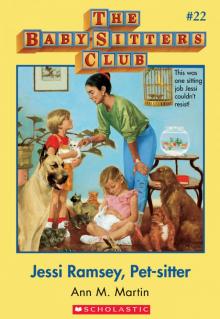 Jessi Ramsey, Pet-Sitter
Jessi Ramsey, Pet-Sitter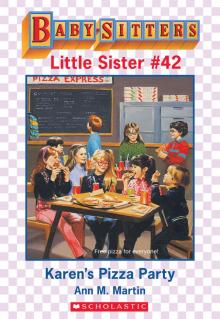 Karen's Pizza Party
Karen's Pizza Party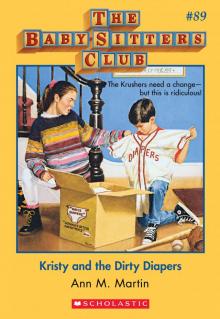 Kristy and the Dirty Diapers
Kristy and the Dirty Diapers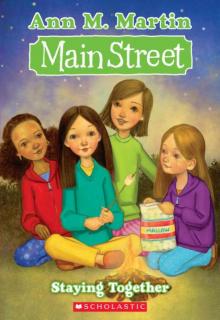 Staying Together
Staying Together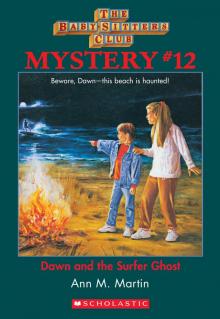 Dawn and the Surfer Ghost
Dawn and the Surfer Ghost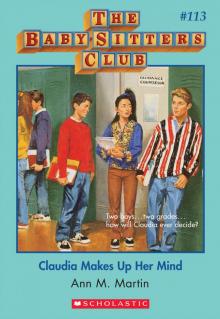 Claudia Makes Up Her Mind
Claudia Makes Up Her Mind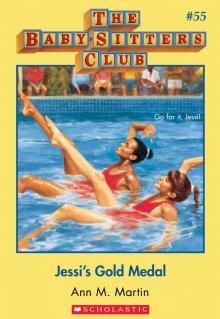 Jessi's Gold Medal
Jessi's Gold Medal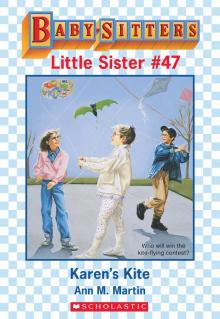 Karen's Kite
Karen's Kite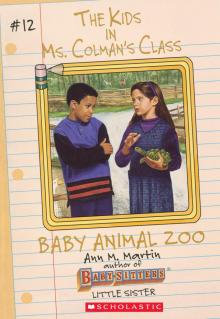 Baby Animal Zoo
Baby Animal Zoo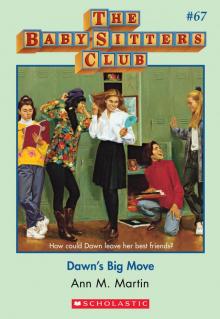 Dawn's Big Move
Dawn's Big Move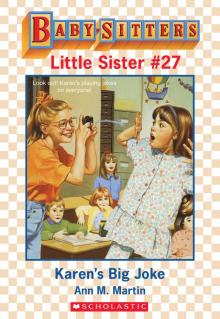 Karen's Big Joke
Karen's Big Joke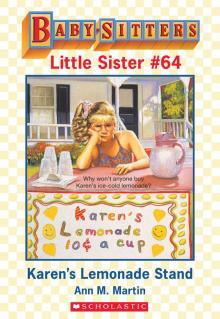 Karen's Lemonade Stand
Karen's Lemonade Stand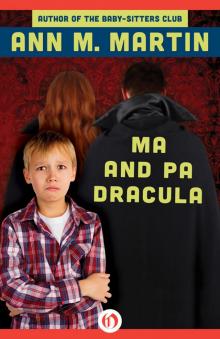 Ma and Pa Dracula
Ma and Pa Dracula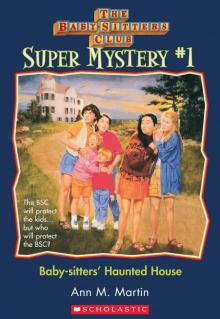 Baby-Sitters' Haunted House
Baby-Sitters' Haunted House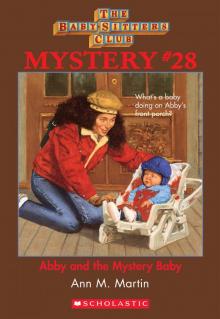 Abby and the Mystery Baby
Abby and the Mystery Baby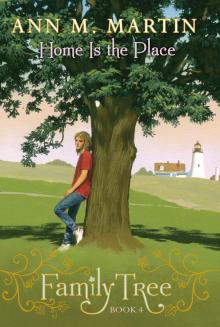 Home Is the Place
Home Is the Place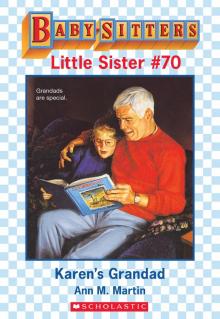 Karen's Grandad
Karen's Grandad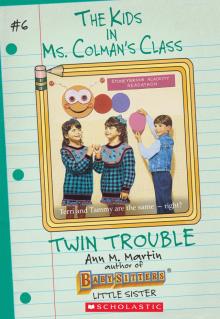 Twin Trouble
Twin Trouble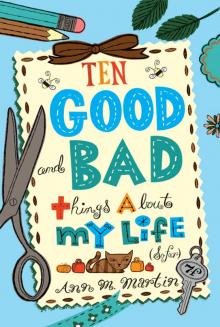 Ten Good and Bad Things About My Life (So Far)
Ten Good and Bad Things About My Life (So Far)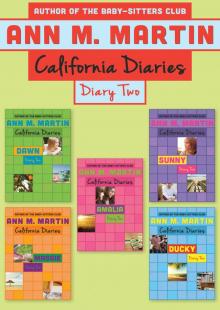 Diary Two
Diary Two Baby-Sitters Club 027
Baby-Sitters Club 027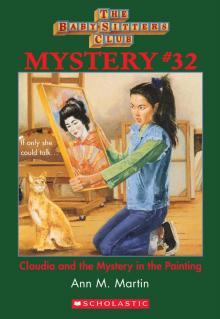 Claudia and the Mystery Painting
Claudia and the Mystery Painting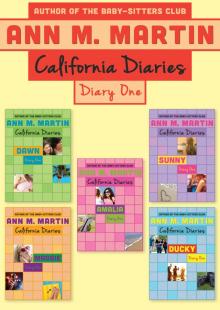 Diary One
Diary One Baby-Sitters Club 037
Baby-Sitters Club 037 Baby-Sitters Club 028
Baby-Sitters Club 028 Baby-Sitters Club 085
Baby-Sitters Club 085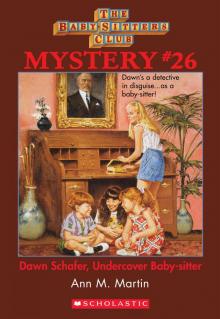 Dawn Schaffer Undercover Baby-Sitter
Dawn Schaffer Undercover Baby-Sitter Jessi's Babysitter
Jessi's Babysitter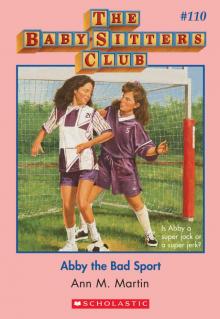 The Baby-Sitters Club #110: Abby the Bad Sport (Baby-Sitters Club, The)
The Baby-Sitters Club #110: Abby the Bad Sport (Baby-Sitters Club, The) Karen's Little Sister
Karen's Little Sister Baby-Sitters Club 058
Baby-Sitters Club 058 Claudia And The Genius On Elm St.
Claudia And The Genius On Elm St.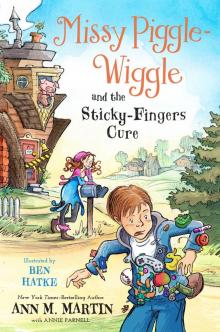 Missy Piggle-Wiggle and the Sticky-Fingers Cure
Missy Piggle-Wiggle and the Sticky-Fingers Cure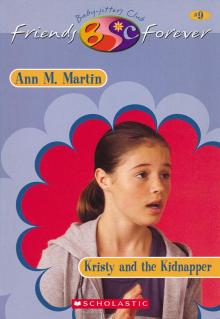 Kristy and Kidnapper
Kristy and Kidnapper Baby-Sitters Club 041
Baby-Sitters Club 041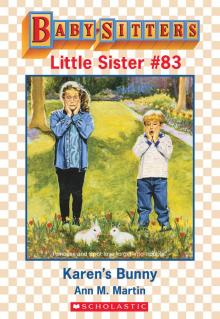 Karen's Bunny Trouble
Karen's Bunny Trouble Baby-Sitters Club 032
Baby-Sitters Club 032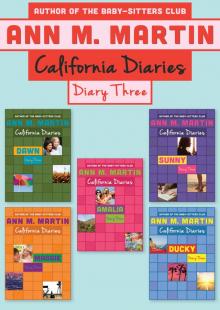 Diary Three
Diary Three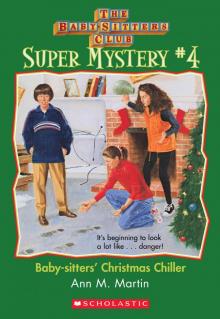 Christmas Chiller
Christmas Chiller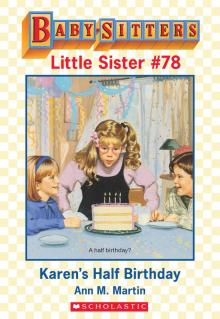 Karen's Half-Birthday
Karen's Half-Birthday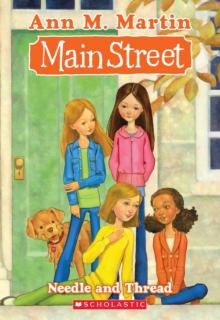 Needle and Thread
Needle and Thread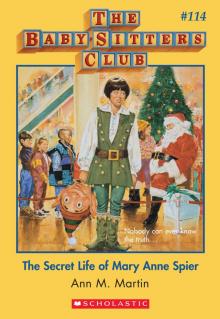 Secret Life of Mary Anne Spier
Secret Life of Mary Anne Spier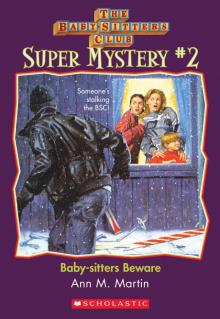 Baby-Sitters Beware
Baby-Sitters Beware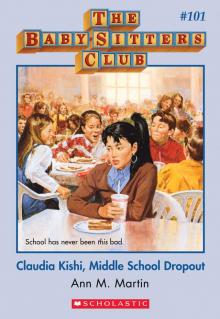 Claudia Kishi, Middle School Drop-Out
Claudia Kishi, Middle School Drop-Out Logan Likes Mary Anne !
Logan Likes Mary Anne ! Baby-Sitters Club 061
Baby-Sitters Club 061 Best Friends
Best Friends Baby-Sitters Club 031
Baby-Sitters Club 031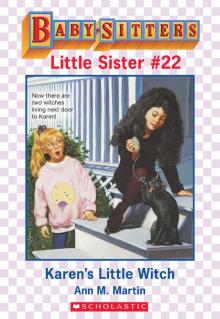 Karen's Little Witch
Karen's Little Witch Jessi Ramsey, Petsitter
Jessi Ramsey, Petsitter Baby-Sitters Club 123
Baby-Sitters Club 123 Baby-Sitters Club 059
Baby-Sitters Club 059 Baby-Sitters Club 033
Baby-Sitters Club 033 Baby-Sitters Club 060
Baby-Sitters Club 060 Baby-Sitters Club 094
Baby-Sitters Club 094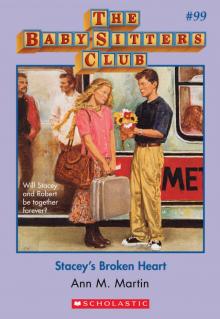 The Baby-Sitters Club #99: Stacey's Broken Heart
The Baby-Sitters Club #99: Stacey's Broken Heart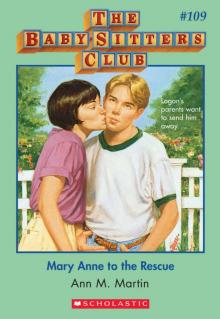 The Baby-Sitters Club #109: Mary Anne to the Rescue (Baby-Sitters Club, The)
The Baby-Sitters Club #109: Mary Anne to the Rescue (Baby-Sitters Club, The) Mystery At Claudia's House
Mystery At Claudia's House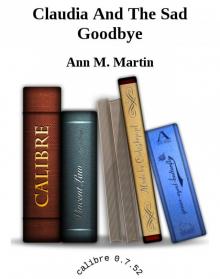 Claudia And The Sad Goodbye
Claudia And The Sad Goodbye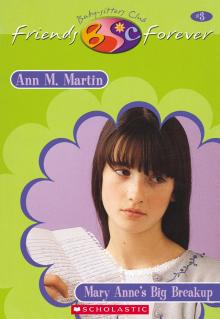 Mary Anne's Big Break-Up
Mary Anne's Big Break-Up Baby-Sitters Club 025
Baby-Sitters Club 025 Baby-Sitters Club 042
Baby-Sitters Club 042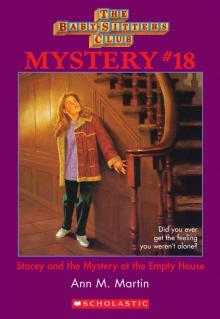 Stacey and the Mystery of the Empty House
Stacey and the Mystery of the Empty House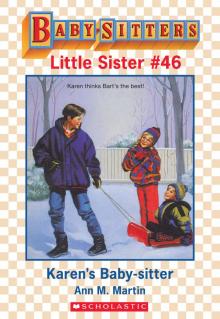 Karen's Baby-Sitter
Karen's Baby-Sitter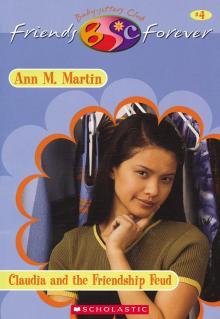 Claudia's Friendship Feud
Claudia's Friendship Feud Baby-Sitters Club 090
Baby-Sitters Club 090 Baby-Sitters Club 021
Baby-Sitters Club 021 Baby-Sitters Club 056
Baby-Sitters Club 056 Baby-Sitters Club 040
Baby-Sitters Club 040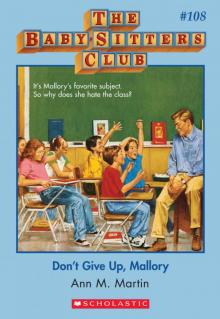 The Baby-Sitters Club #108: Don't Give Up, Mallory (Baby-Sitters Club, The)
The Baby-Sitters Club #108: Don't Give Up, Mallory (Baby-Sitters Club, The)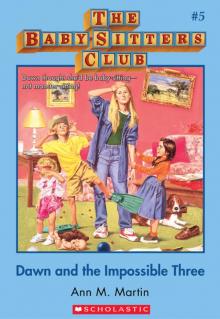 Dawn and the Impossible Three
Dawn and the Impossible Three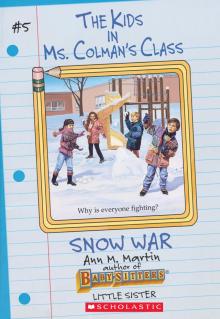 The Snow War
The Snow War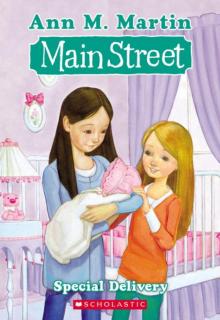 Special Delivery
Special Delivery Baby-Sitters Club 057
Baby-Sitters Club 057 Mary Anne And Too Many Babies
Mary Anne And Too Many Babies Baby-Sitters Club 030
Baby-Sitters Club 030